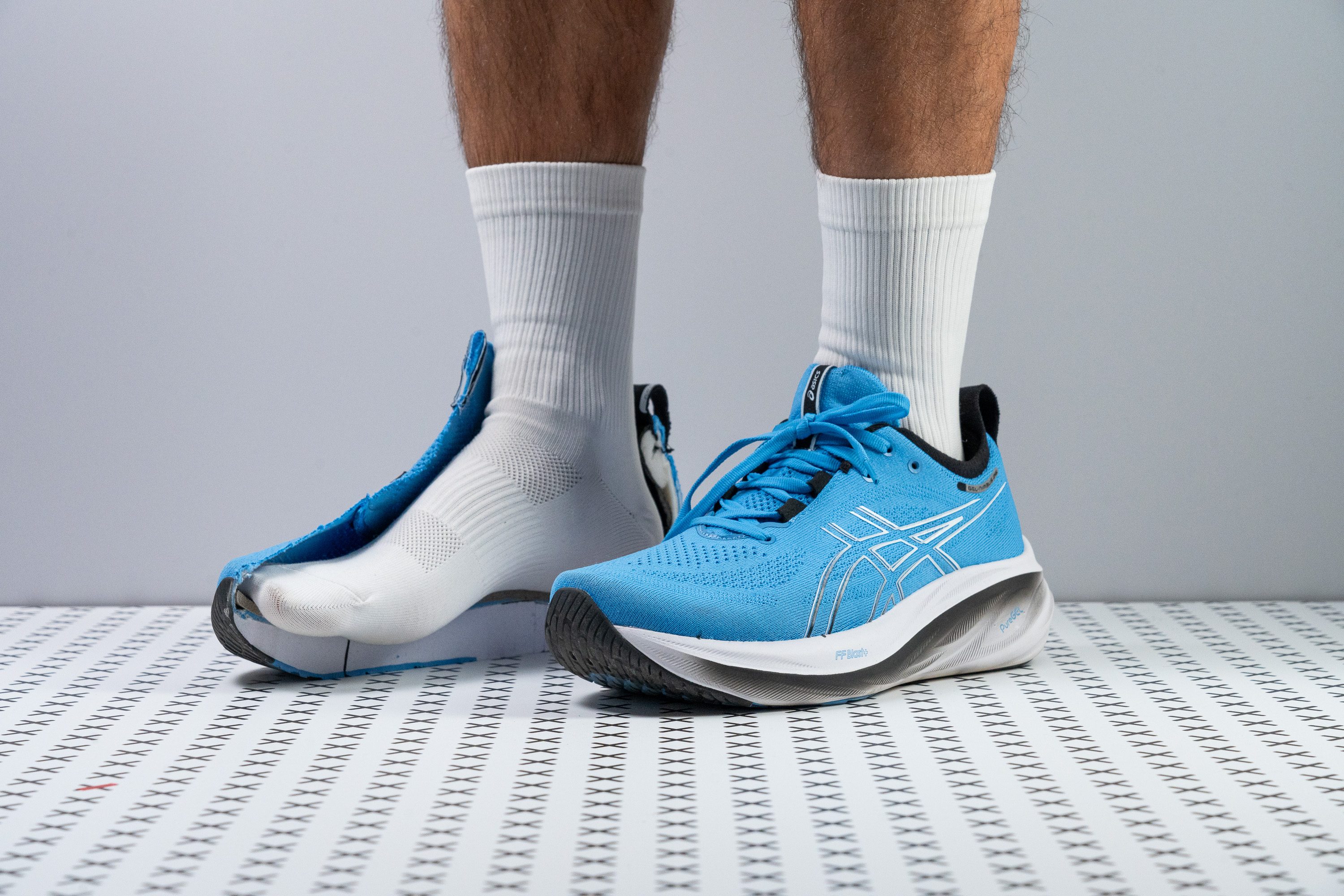Our verdict
- Top pick in best running shoes (2024)
- Top pick in best long distance running shoes (2024)
Pros
- Premium all-around comfort
- Enhanced toebox design
- Exceptional traction
- Best-in-series outsole
- Ideal for long distances
- Superb knit upper
- Surprisingly stable
- A dream for heel strikers
Cons
- Increased weight
- Limited energy return
- Tongue lacks padding
Audience verdict
- Top 26% in road running shoes
- Top 25% in neutral running shoes
- Top 7% most popular running shoes
Comparison
The most similar running shoes compared
+ + Add a shoe | |||||
|---|---|---|---|---|---|
| Audience score | 89 Great! | 86 Good! | 91 Superb! | 90 Superb! | |
| Price | £180 | £180 | £170 | £210 | |
| Pace | Daily running | Daily running | Daily running | Daily runningTempo | |
| Arch support | Neutral | Neutral | Neutral | Neutral | |
| Weight lab Weight brand | 10.7 oz / 303g 10.7 oz / 304g | 10.5 oz / 299g 10.8 oz / 305g | 10.3 oz / 291g 10.3 oz / 292g | 8.9 oz / 252g 8.8 oz / 250g | |
| Drop lab Drop brand | 8.4 mm 8.0 mm | 8.3 mm 8.0 mm | 9.6 mm 8.0 mm | 8.2 mm 8.0 mm | |
| Strike pattern | HeelMid/forefoot | HeelMid/forefoot | HeelMid/forefoot | HeelMid/forefoot | |
| Size | True to size | True to size | True to size | True to size | |
| Midsole softness | Soft | Balanced | Soft | Soft | |
| Difference in midsole softness in cold | Normal | Small | Big | Small | |
| Toebox durability | Good | Decent | Decent | Good | |
| Heel padding durability | Good | Good | Decent | Good | |
| Outsole durability | Good | Good | Decent | Good | |
| Breathability | Moderate | Moderate | Moderate | Breathable | |
| Width / fit | Wide | Medium | Medium | Medium | |
| Toebox width | Medium | Medium | Medium | Medium | |
| Stiffness | Moderate | Stiff | Stiff | Stiff | |
| Torsional rigidity | Stiff | Stiff | Stiff | Stiff | |
| Heel counter stiffness | Moderate | Stiff | Moderate | Moderate | |
| Rocker | ✓ | ✓ | ✓ | ✓ | |
| Heel lab Heel brand | 40.4 mm 42.0 mm | 42.7 mm 44.0 mm | 42.9 mm 47.0 mm | 42.8 mm 45.0 mm | |
| Forefoot lab Forefoot brand | 32.0 mm 34.0 mm | 34.4 mm 36.0 mm | 33.3 mm 39.0 mm | 34.6 mm 37.0 mm | |
| Widths available | NormalWideX-Wide | NormalWideX-Wide | Normal | NormalWide | |
| Orthotic friendly | ✓ | ✓ | ✓ | ✓ | |
| Season | All seasons | All seasons | All seasons | SummerAll seasons | |
| Removable insole | ✓ | ✓ | ✓ | ✓ | |
| Ranking | #157 Top 25% | #174 Top 48% | #32 Top 9% | #74 Top 21% | |
| Popularity | #43 Top 7% | #18 Top 5% | #168 Top 46% | #25 Top 7% |
Who should buy
We highly recommend the ASICS Nimbus 26 for:
- Runners seeking a luxurious, comfortable experience on easy and moderate runs.
- ASICS fans desiring a super-cushioned shoe for long distances and daily training.
- Those who prioritise top-notch uppers, as the Nimbus 26's knit material offers a premium feel, excellent lockdown, good ventilation and ample toebox space.
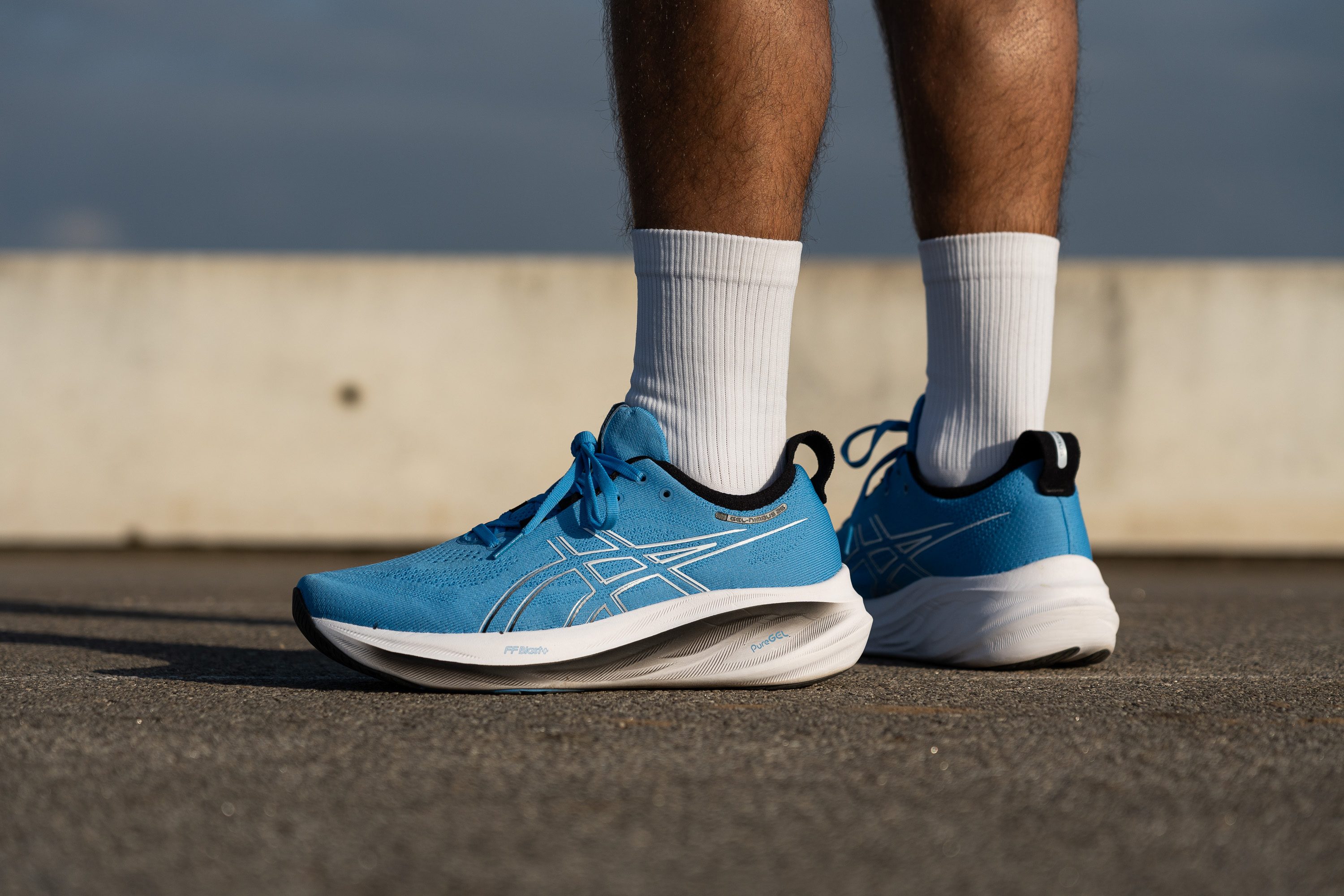
Who should NOT buy
While the Nimbus 26 does offer a protective ride, we do not recommend it for runners seeking a lightweight shoe for uptempo paces. ASICS also has in its lineup a better—albeit pricier—alternative in the Superblast, which is significantly bouncier and lighter.
We also believe the Nimbus 26's price point may deter some runners. For those seeking a more budget-friendly option without sacrificing the super-high stack height, we've lab-tested the ASICS Novablast 4 and the Brooks Ghost Max. These models provide a comparable cushioned experience at a slightly more accessible price.
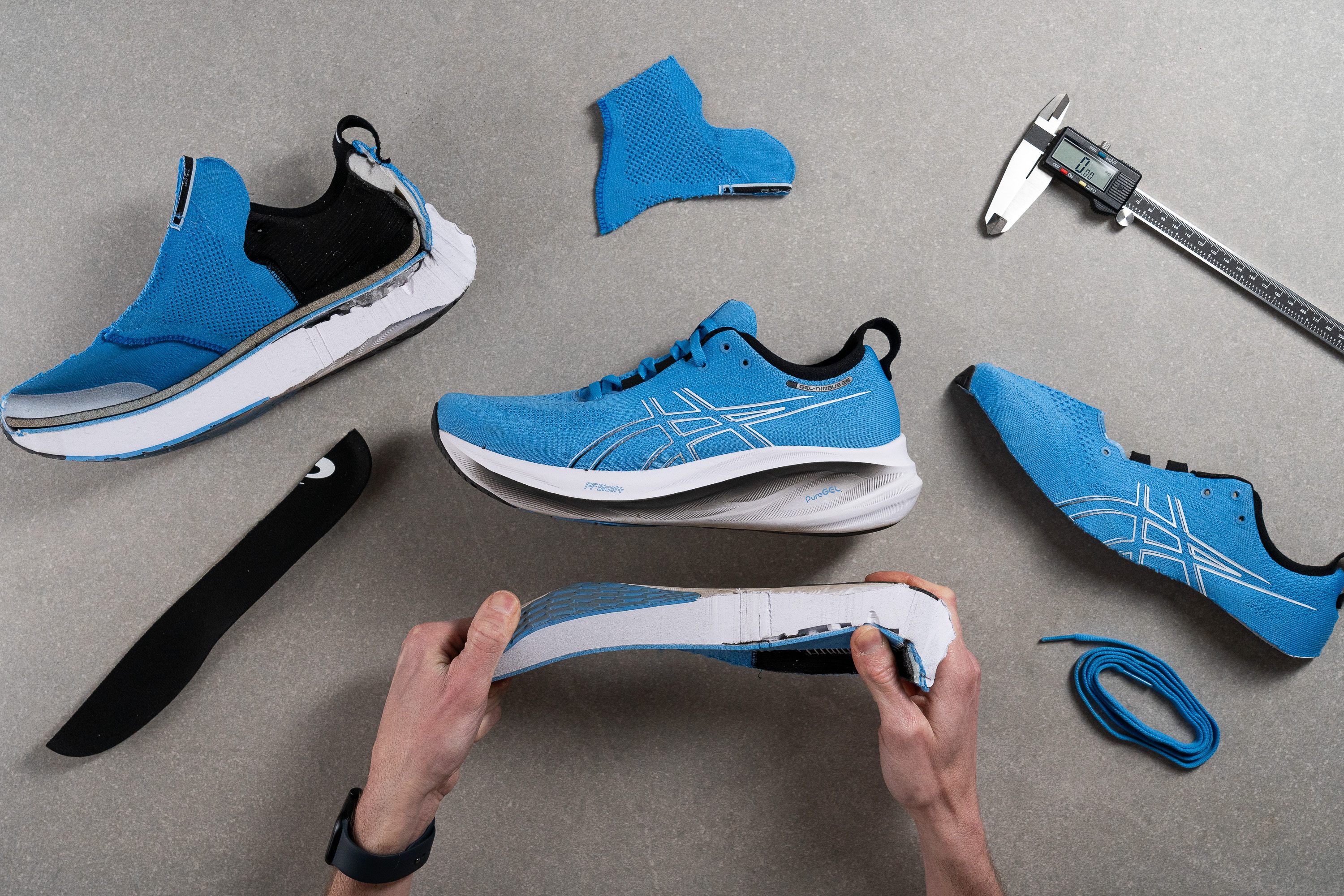
For those seeking an affordable yet cushioned running shoe, we suggest the Saucony Axon 3.
Cushioning
Shock absorption
The Nimbus keeps adding foam, which boosts shock absorption significantly—something many runners will love, though it might turn off those craving a more ground-connected feel. We measured 135 SA in the heel and a staggering 127 SA in the forefoot.
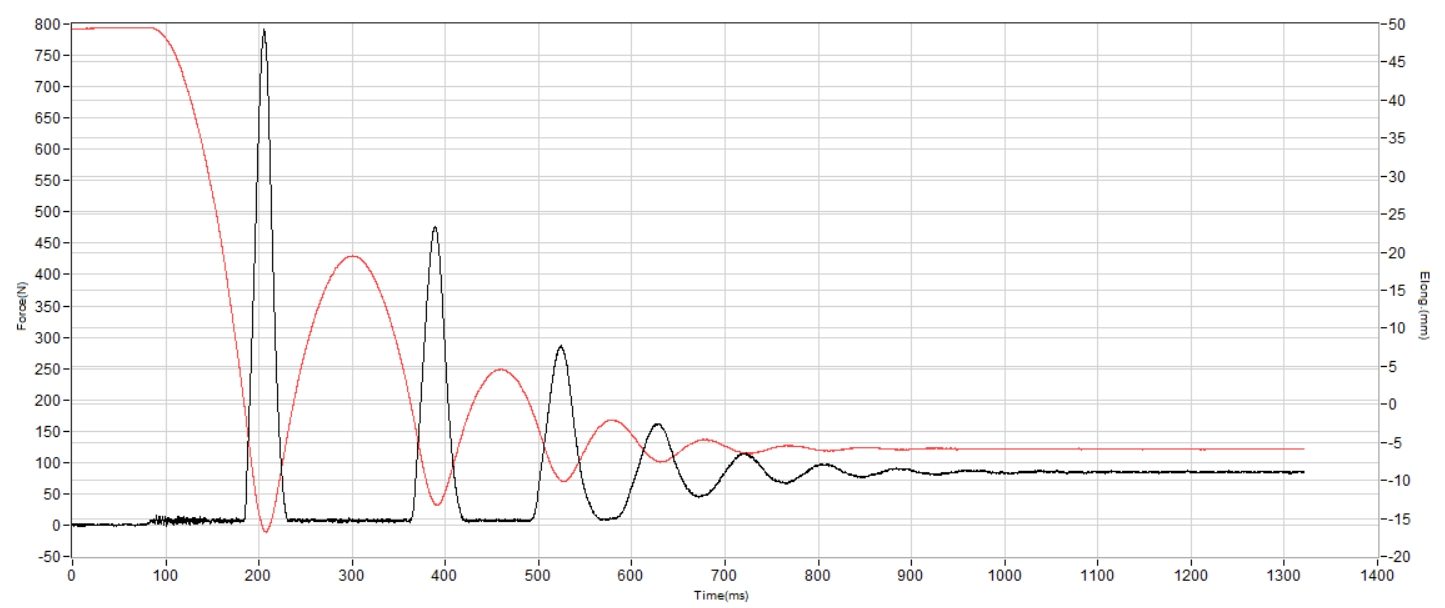
| Gel Nimbus 26 | 135 SA |
| Average | 129 SA |
Energy return
In our second test using the ASTM F1976 standard, we measured a modest 48.3% energy return.
That’s no shock—it’s still the same FF Blast+ foam from v25, so expecting a drastic shift would've been wishful thinking. Even so, this remains by far the shoe’s biggest shortfall, especially for runners considering it for long runs.
| Gel Nimbus 26 | 48.3% |
| Average | 58.6% |
Heel stack
The Nimbus 26 has fully embraced the maximalist, high-stack trend, with the stack height climbing an additional 2.4 mm from last year, reaching a skyscraper-high, 40.4 mm in the heel.
What's the takeaway of this increase? The Nimbus has long been ASICS's flagship model for max-cushioning and comfort, and it seems they're doubling down to ensure a cloud-like, ultra-comfy ride for every runner, regardless of weight.
Furthermore, as evidenced next to our digital calliper, it's not all foam at play here—ASICS has used again the PureGEL technology, amplifying the softness of each heel landing. More on this later!
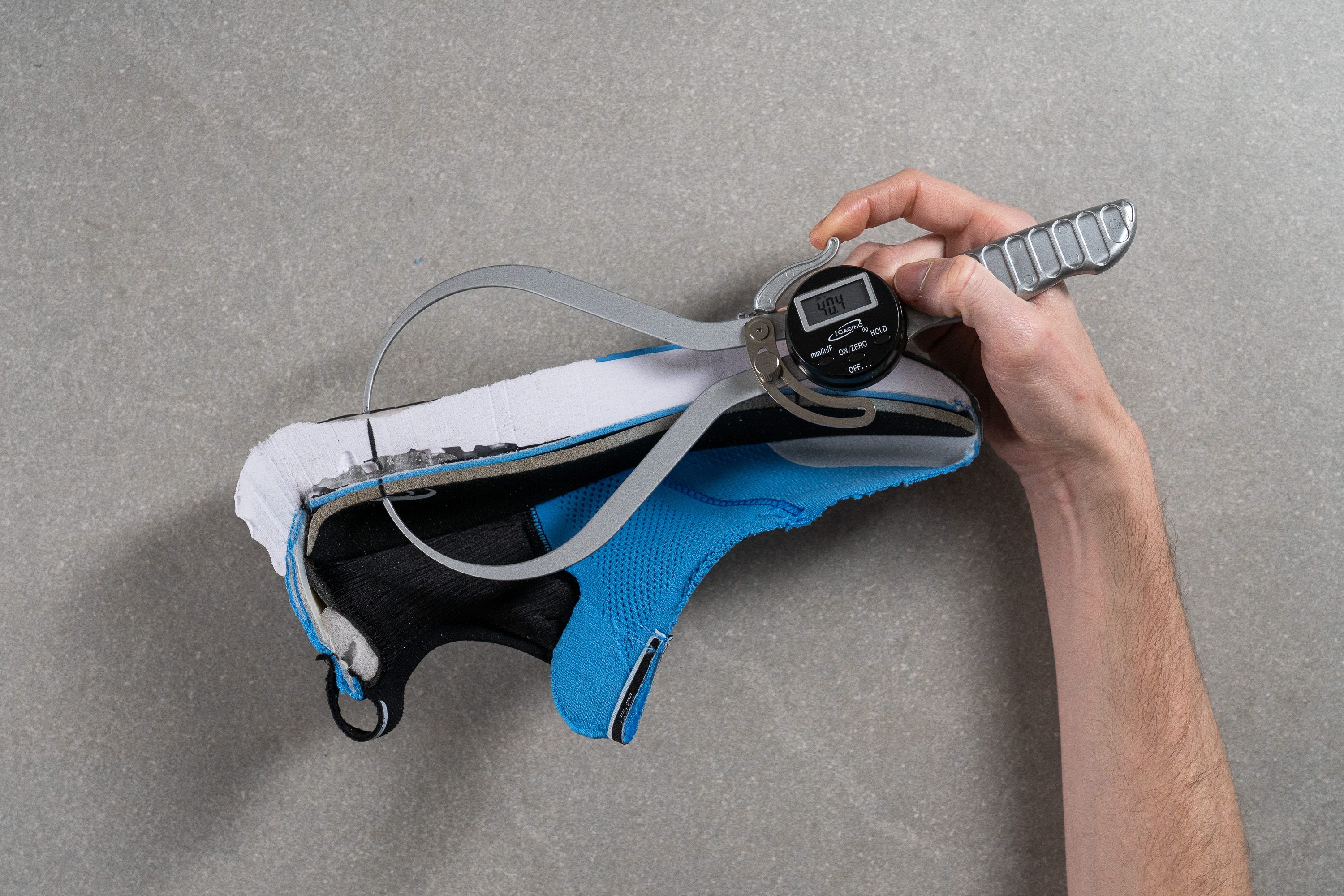
| Gel Nimbus 26 | 40.4 mm |
| Average | 34.7 mm |
Forefoot stack
During all our test runs, we experienced absolutely no ground feel and a significant amount of cushion under the ball of the foot.
This didn't come as a surprise, especially after our second measurement in that area revealed a whopping 32.0 mm of cushioning—ideal for long runs!
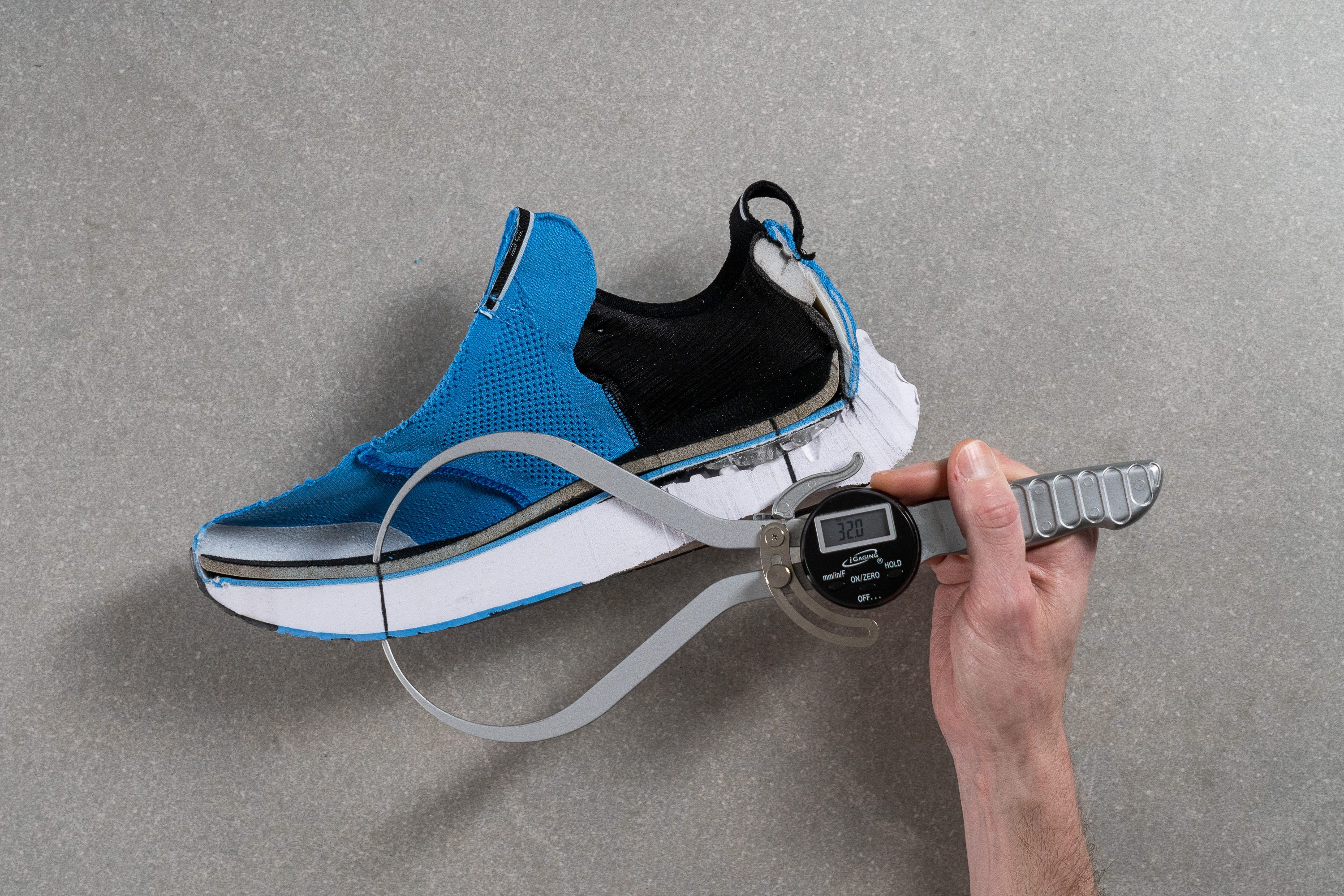
| Gel Nimbus 26 | 32.0 mm |
| Average | 26.1 mm |
Drop
ASICS claims the Nimbus 26 has an 8-mm heel-to-toe drop, and our lab measurements (8.4 mm), taken following the official guidelines from World Athletics, confirmed they were really close. This is a rarity, since we often encounter larger discrepancies.
With this offset, we believe it accommodates all types of runners, from those who strike with their rearfoot to those who hit the ground first with their forefoot.
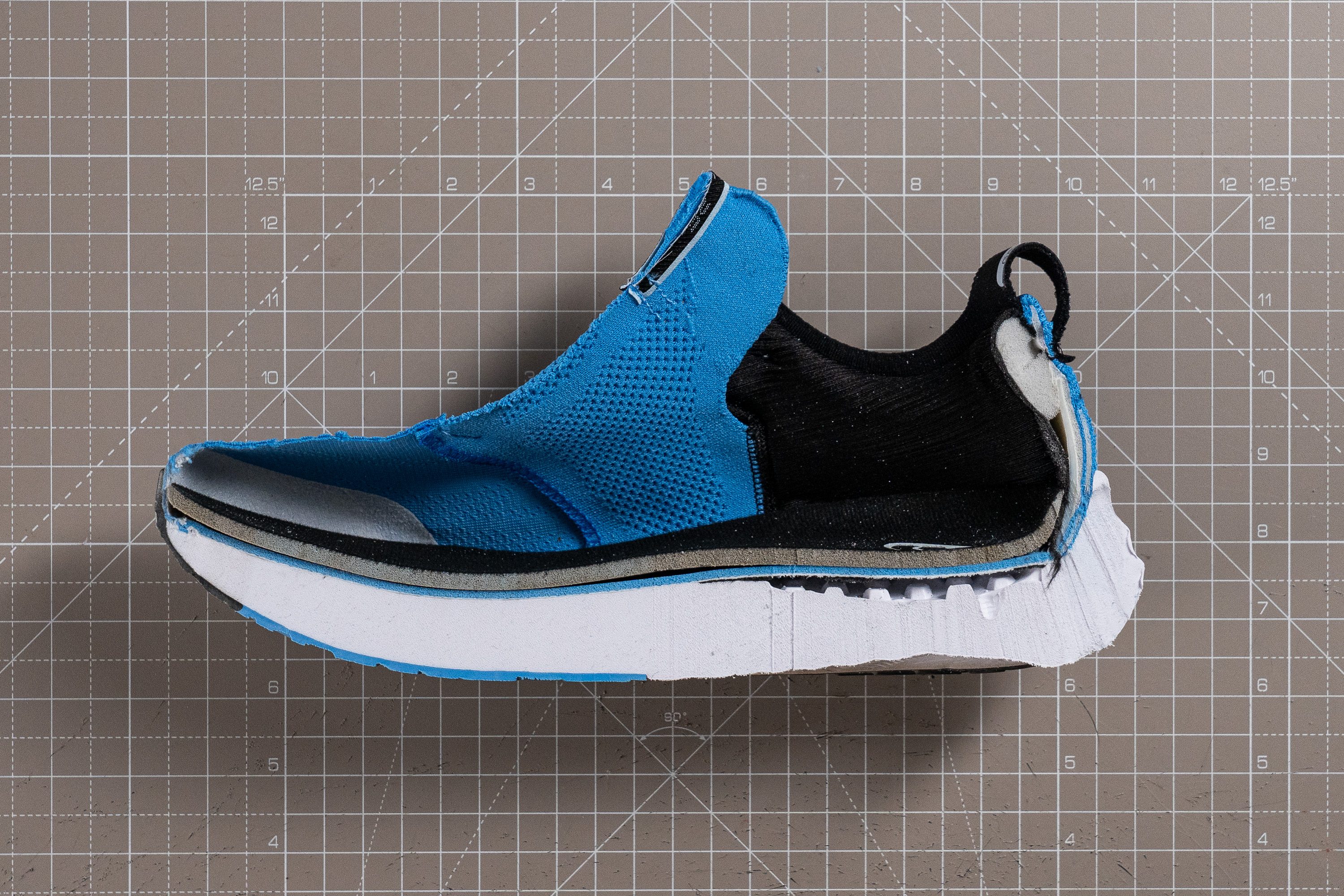
| Gel Nimbus 26 | 8.4 mm |
| Average | 8.6 mm |
Midsole softness
ASICS has incorporated a full-length layer of FF Blast+ ECO foam, same of last year's version. Our durometer readings showed a softness level at 18.5 HA, indicating a plush sensation without excessive sink.
This balanced approach is beneficial, given the foam's composition of EVA and Olefin, making it best suited for easy to moderate runs, as it's not very resilient.
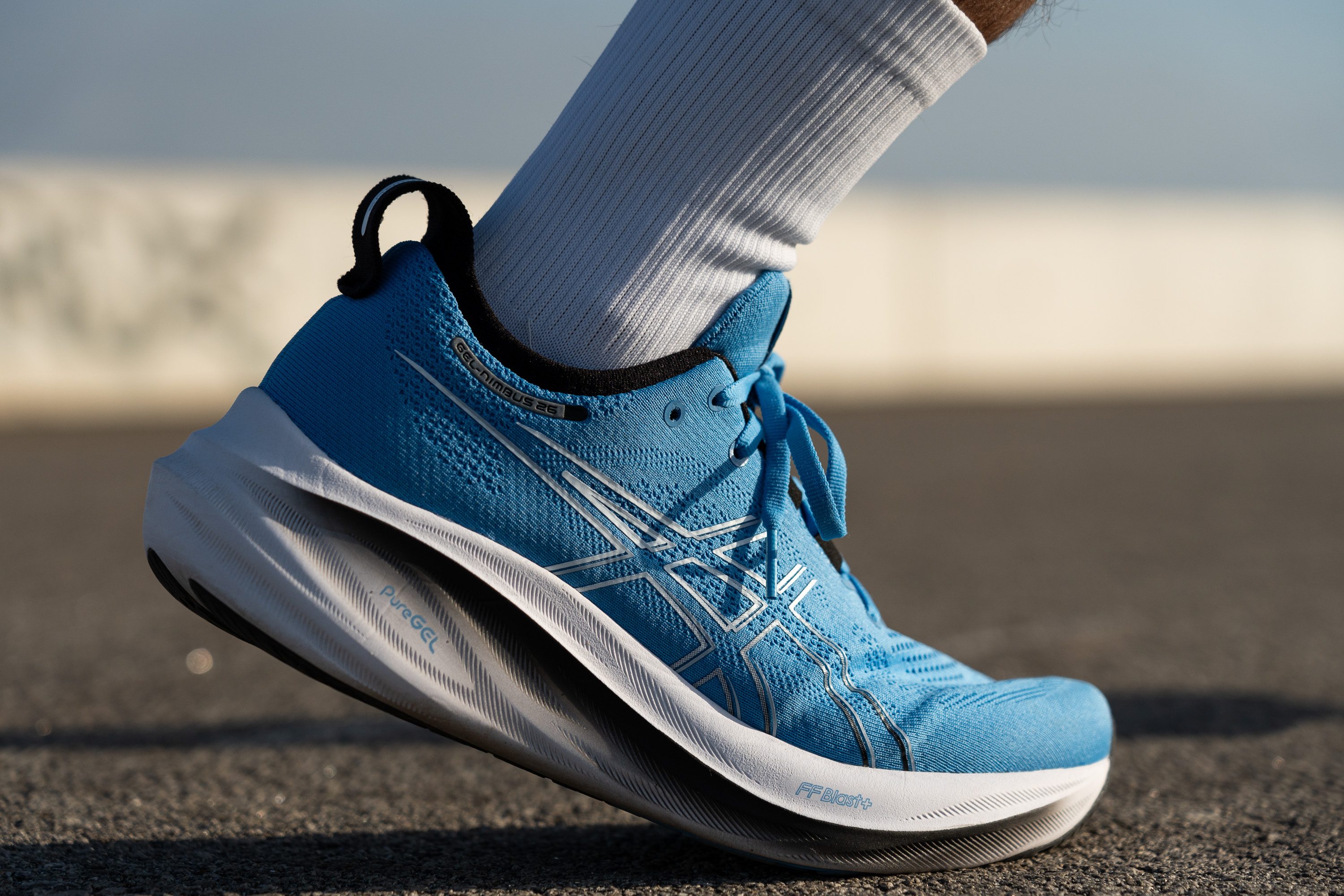
Because of that, it's not designed for anything fast that demands massive energy return from the midsole. For runners seeking that, the Nike Invincible 3 might be a better fit, featuring the super-bouncy ZoomX foam in a similar design.
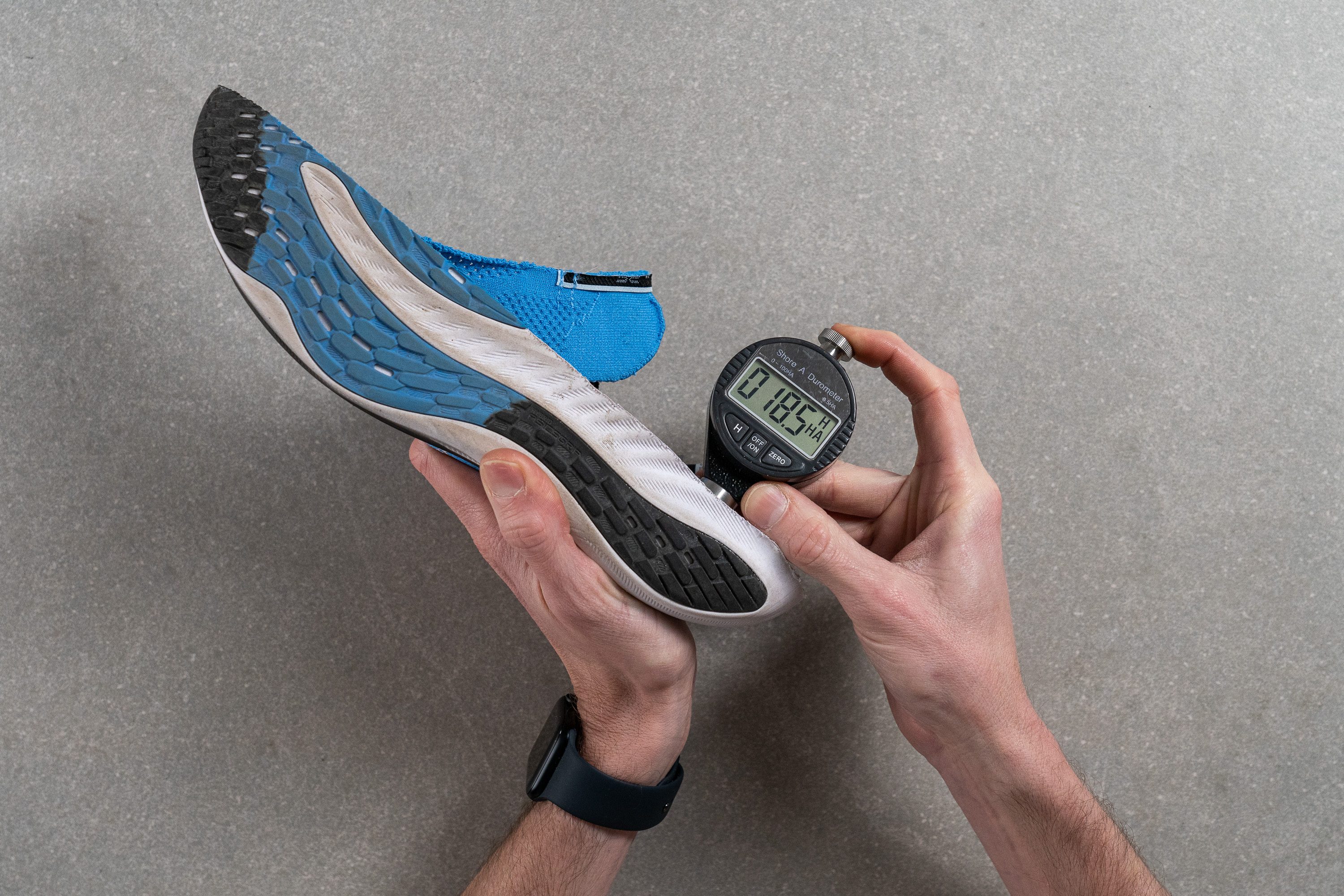
| Gel Nimbus 26 | 18.5 HA |
| Average | 20.4 HA |
Secondary foam softness
The heel retains its distinctive, oversized finger-loop tab from the previous design. This striking addition isn't just visually amazing, we found it makes sliding into the knit upper a breeze!
PureGEL
As mentioned earlier, the heel boasts one of ASICS's latest innovations: PureGEL.
This advanced version of the traditional GEL technology ASICS has utilised for years is a compact piece positioned above the foam in the rearfoot area, facilitating softer landings. True to its design, it delivers precisely that sensation, yet obviously lacks any energy return. It's all about comfort.
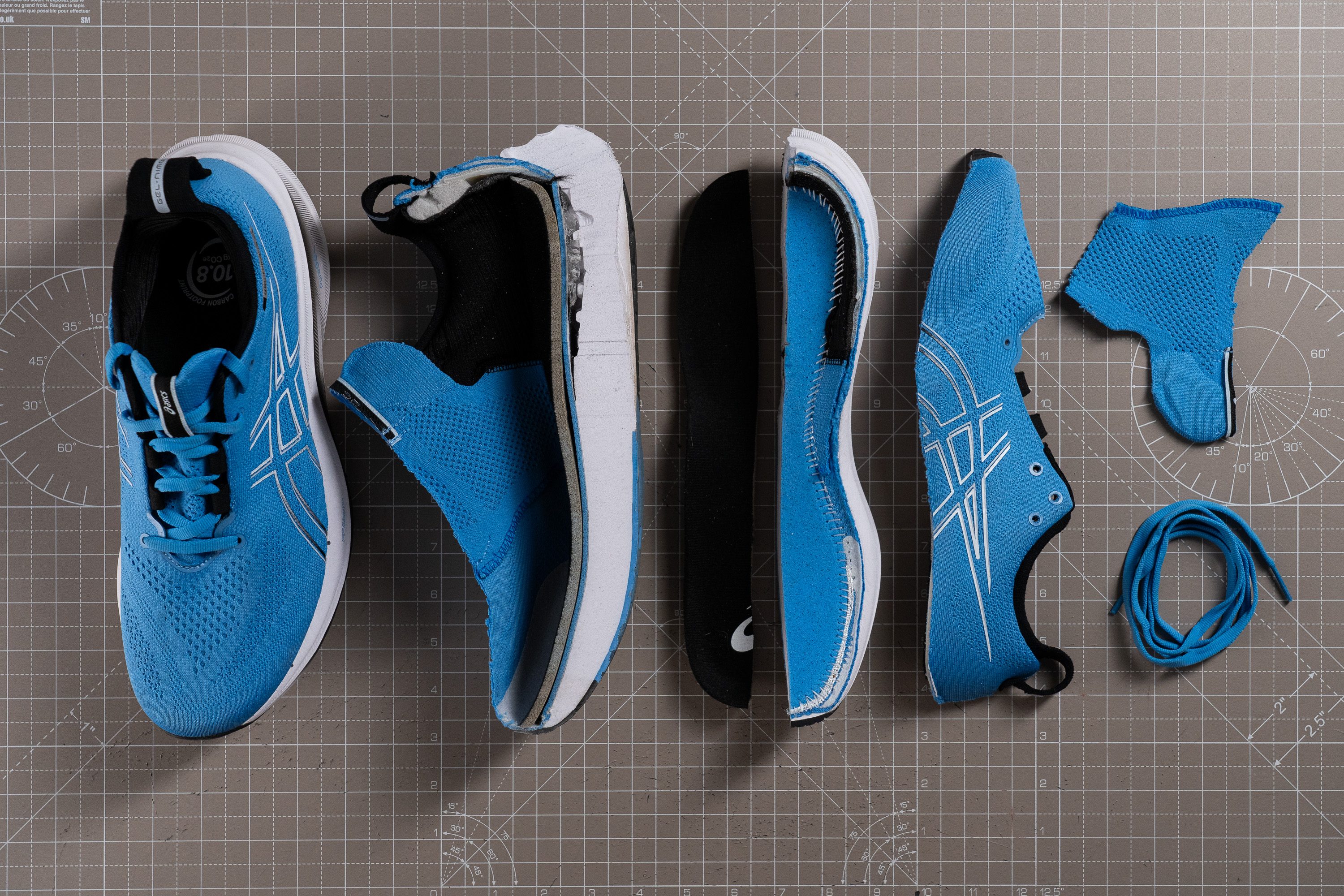
Size and fit
Size
ASICS Gel Nimbus 26 fits true to size (256 votes).
Width / Fit
We found that ASICS has genuinely embraced user feedback, as the fit of the Nimbus 26 is noticeably broader and more comfortable compared to previous generations—something we felt immediately during our first test run.
Afterward, we created a custom gel formulation, initially liquid but solidified in our refrigerator, allowing for precise width measurements. The first result, at 98.1 mm, confirmed our initial impressions.
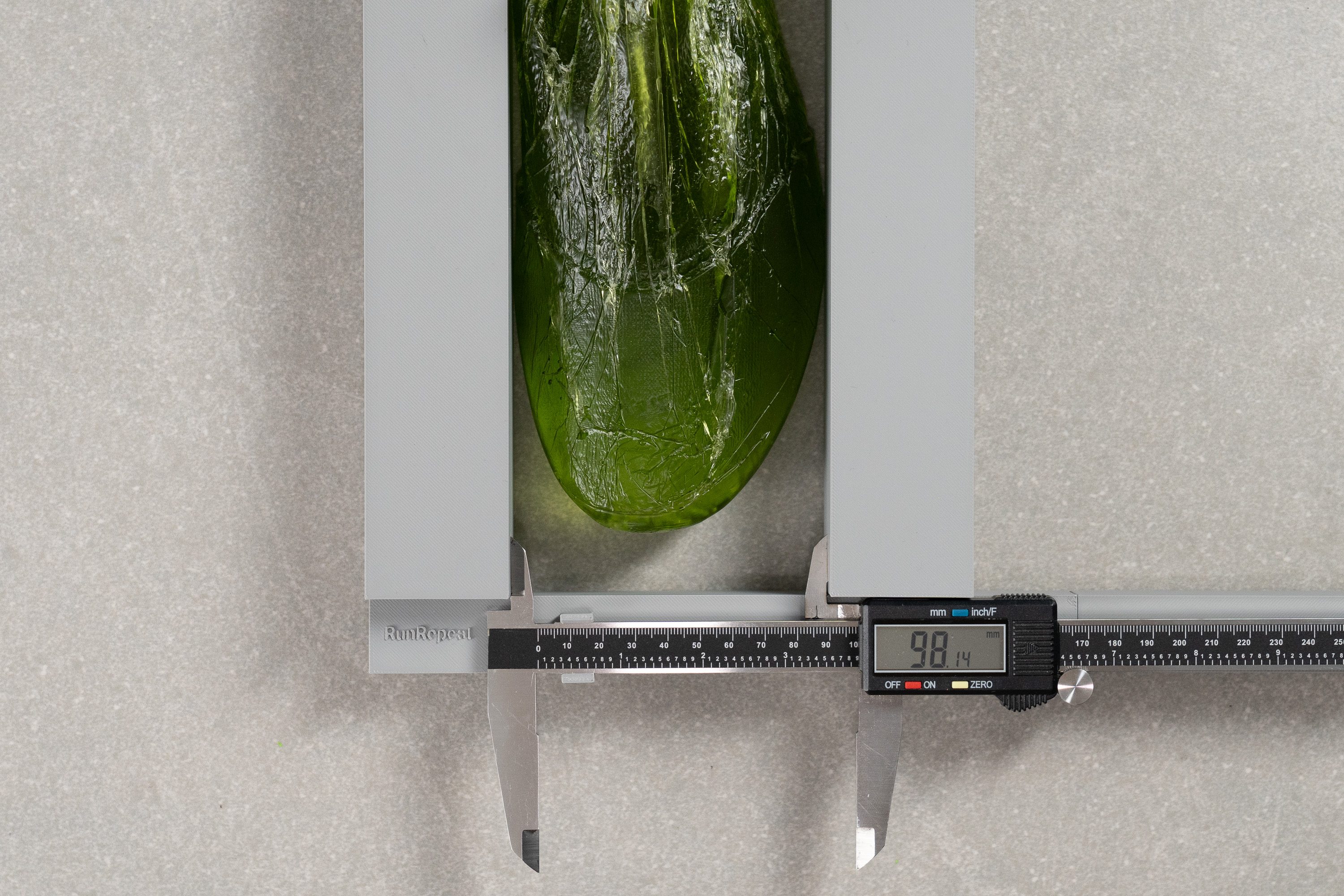
| Gel Nimbus 26 | 98.1 mm |
| Average | 95.1 mm |
Toebox width
Using our gel mold again, we conducted another measurement, this time in the big toe area. In this case, the digital caliper recorded 74.2 mm—a balanced, well-structured width, yet not wide by any means.
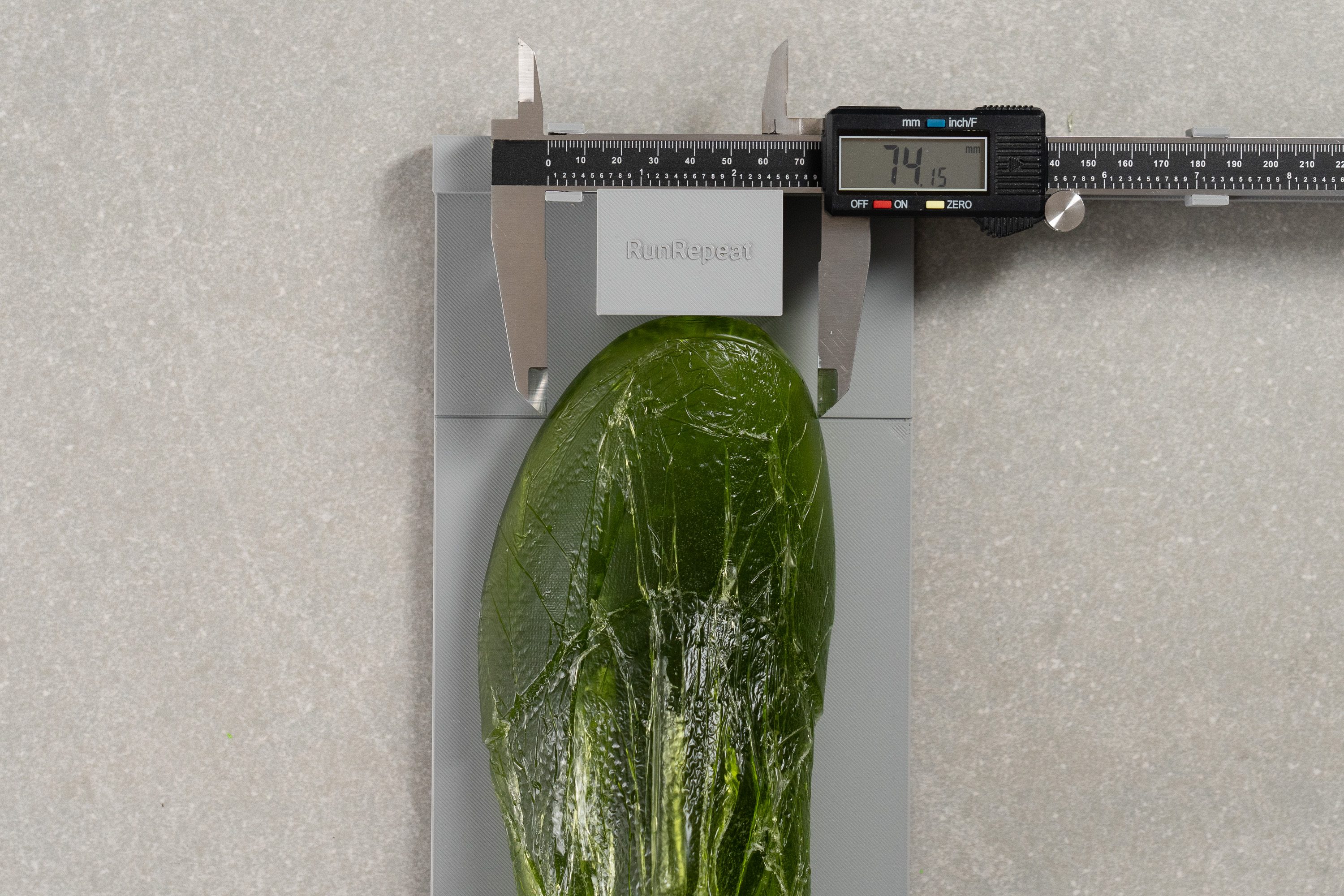
| Gel Nimbus 26 | 74.2 mm |
| Average | 73.3 mm |
Toebox height
On the flip side, for those with high-volume feet, a word of caution: the Nimbus 26 sits fairly low on the toes, with our measurement recording just 24.5 mm.
However, through our evaluation, we discovered that the ultra-stretchy knit upper compensates well, offering a sock-like fit that minimises pressure and enhances comfort. It ultimately comes down to personal preference!
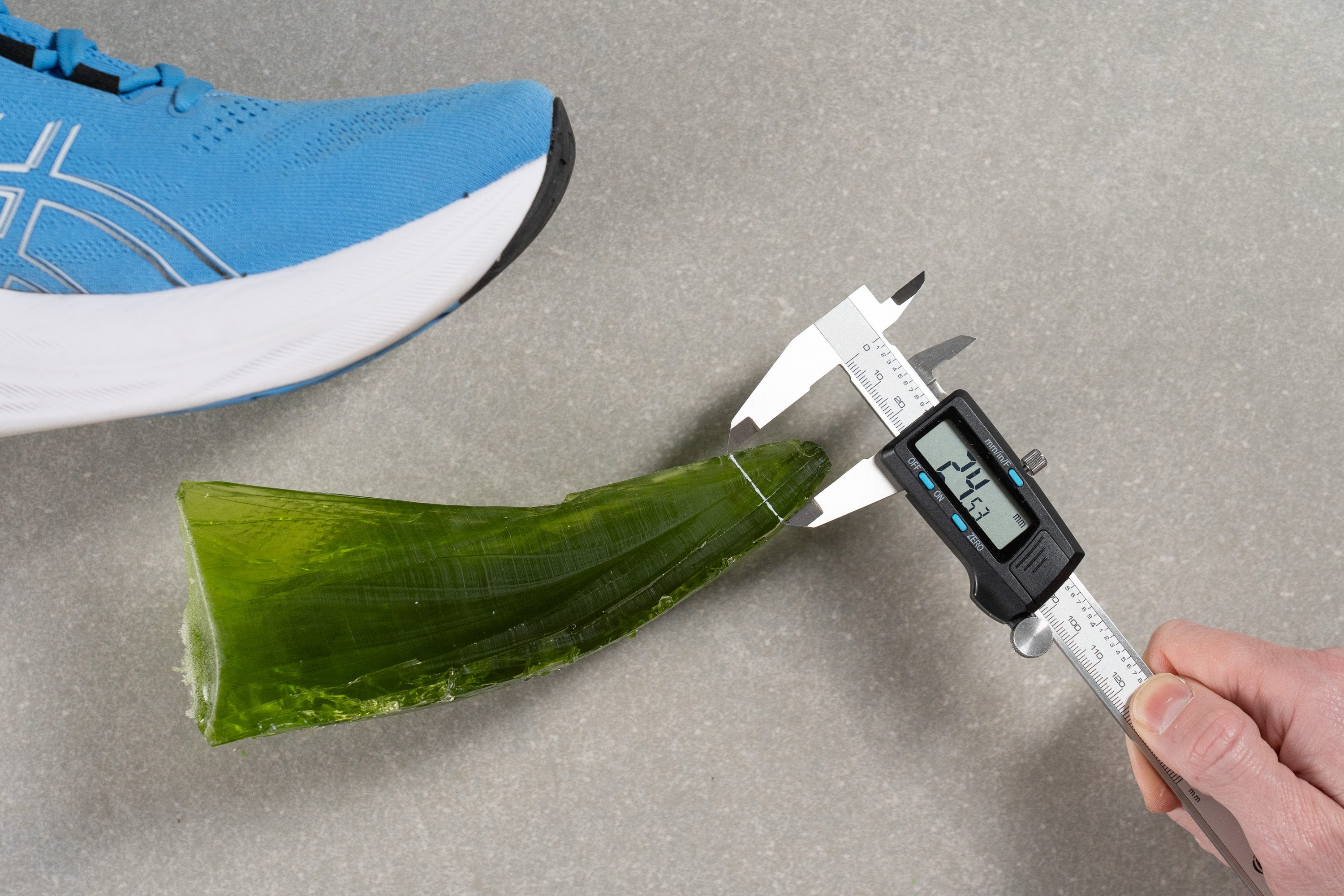
| Gel Nimbus 26 | 24.5 mm |
| Average | 27.1 mm |
Traction / Grip
Traction test
We tested the ASICS Gel Nimbus 26 using our wet-condition grip setup, and it blew past expectations with an outstanding 0.85 score. That’s one of the highest results we've recorded in the lab.
Many shoes without full-length rubber coverage struggle when the pavement gets slick, but the Nimbus 26 held firm, even during fast-paced transitions on soaked concrete. Compared to the previous version, which hovered around average in this same test, the improvement is absolutely massive and the upgrade is a no-brainer.
| Gel Nimbus 26 | 0.85 |
| Average | 0.48 |
Outsole design
The outsole showcases significant upgrades from the v25, now incorporating a mix of AHAR+ (black, heel) and ASICSGRIP (blue, forefoot) rubber for enhanced traction. The rubber coverage is also greater compared to its predecessor, which is another bonus.
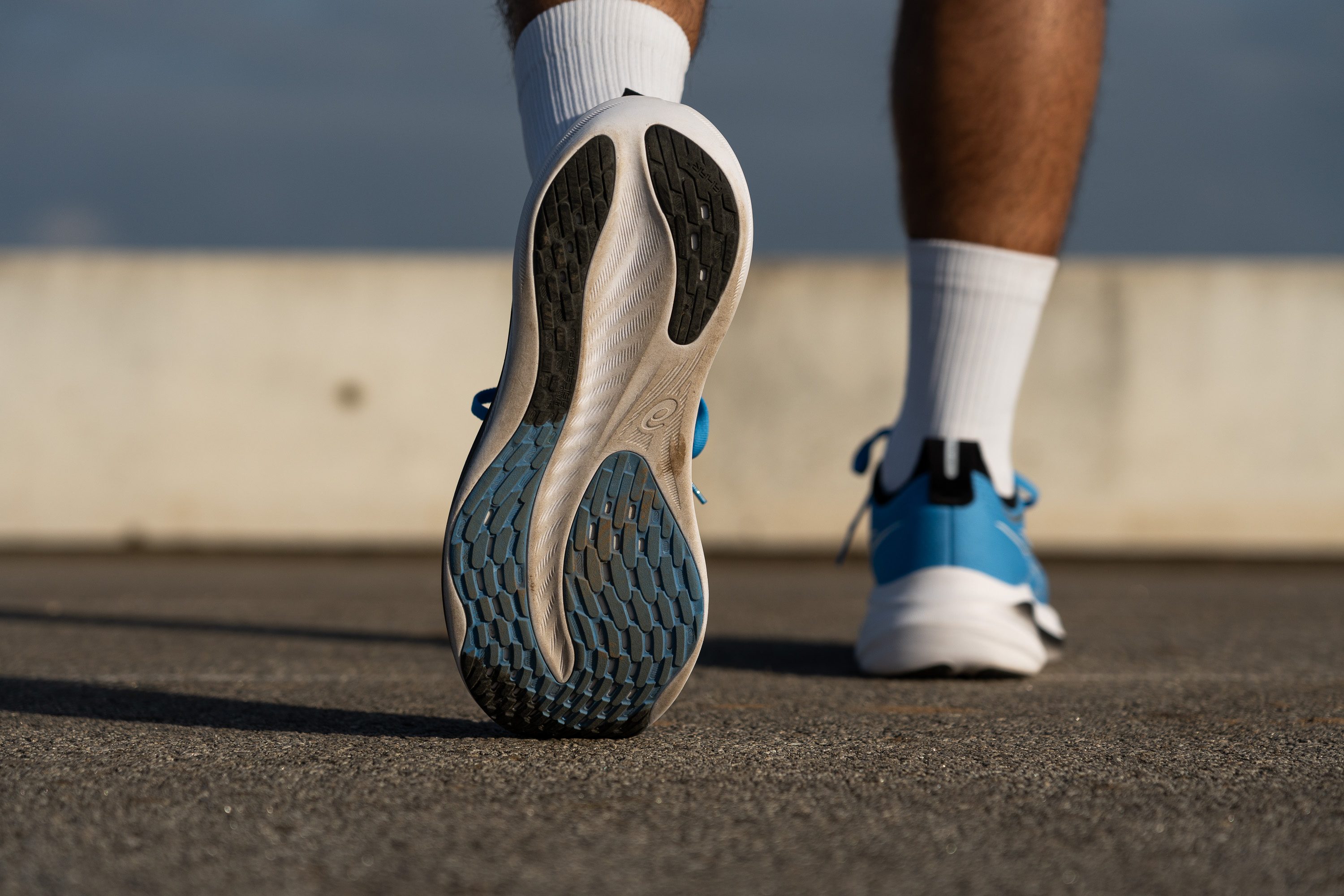
Flexibility / Stiffness
Previously, our manual assessment revealed the shoe's exceptional torsional rigidity, as we couldn't twist or bend it. Yet, evaluating it longitudinally was still on our to-do list.
During this 30-degree longitudinal bend test, we discovered the shoe to be more flexible than from a torsional standpoint, displaying average stiffness. It required only 14.8N of force to bend, which bodes well for comfort and gets the easy-pace seal of approval.
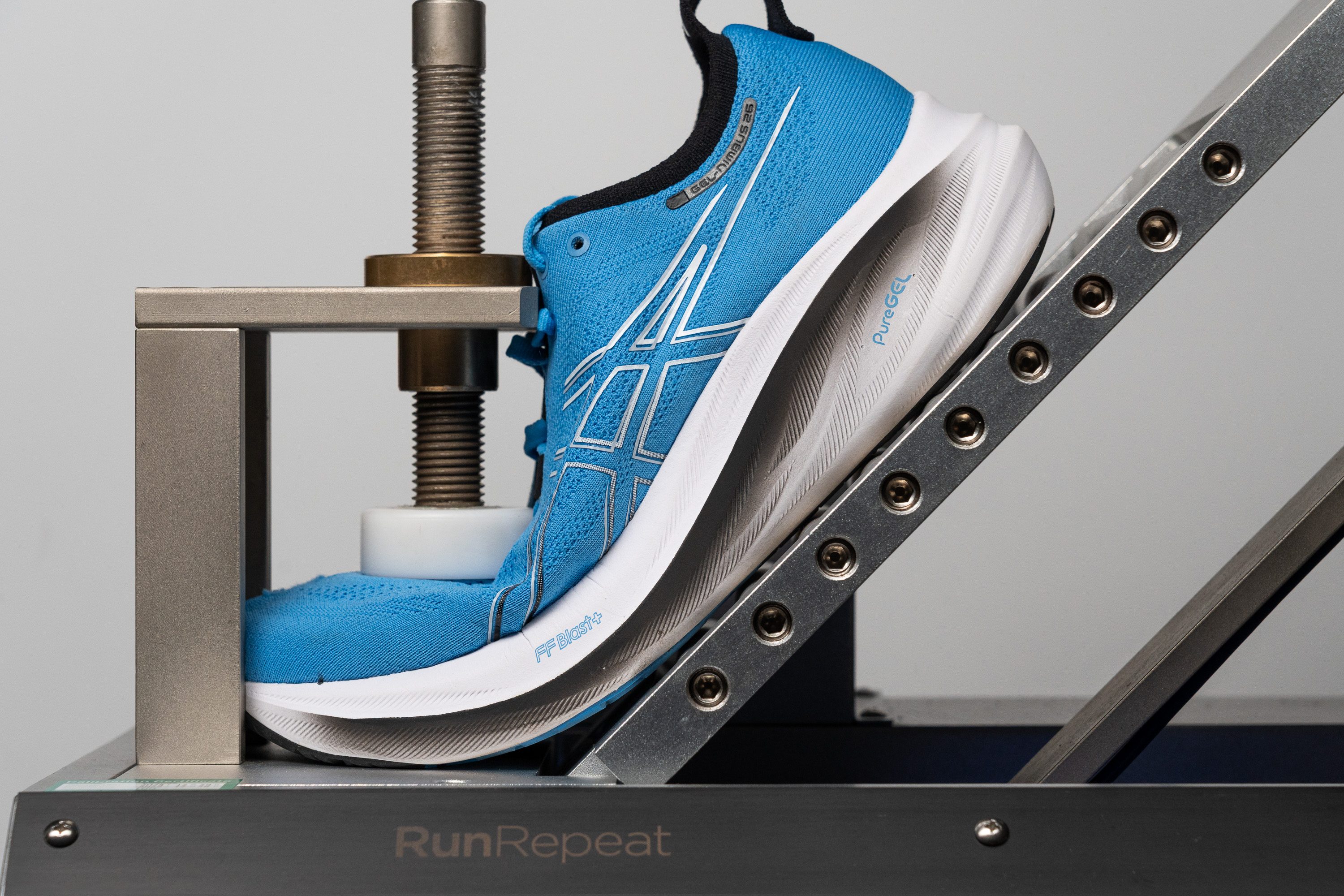
| Gel Nimbus 26 | 14.8N |
| Average | 15.2N |
Stiffness in cold (%)
Similar to our midsole softness test, we reassessed the stiffness after a 20-minute chill in the freezer.
Remarkably, the shoe became just 10.4% firmer, further highlighting the outstanding qualities of the FF Blast+ (EVA mixed with Olefin) foam. This level of performance is exactly what we anticipate from a premium-priced shoe.
| Gel Nimbus 26 | 10% |
| Average | 33% |
Weight
Addressing the weight is unavoidable when discussing the Nimbus 26—it's the glaring issue we can't overlook.
Tipping the scales at 10.7 oz (303g), it's not only heavier than its predecessor but also feels quite bulky by modern standards. While it's not excessively heavy to the point of being a deal-breaker, we firmly believe ASICS should aim to bring this shoe under the 10-ounce mark.
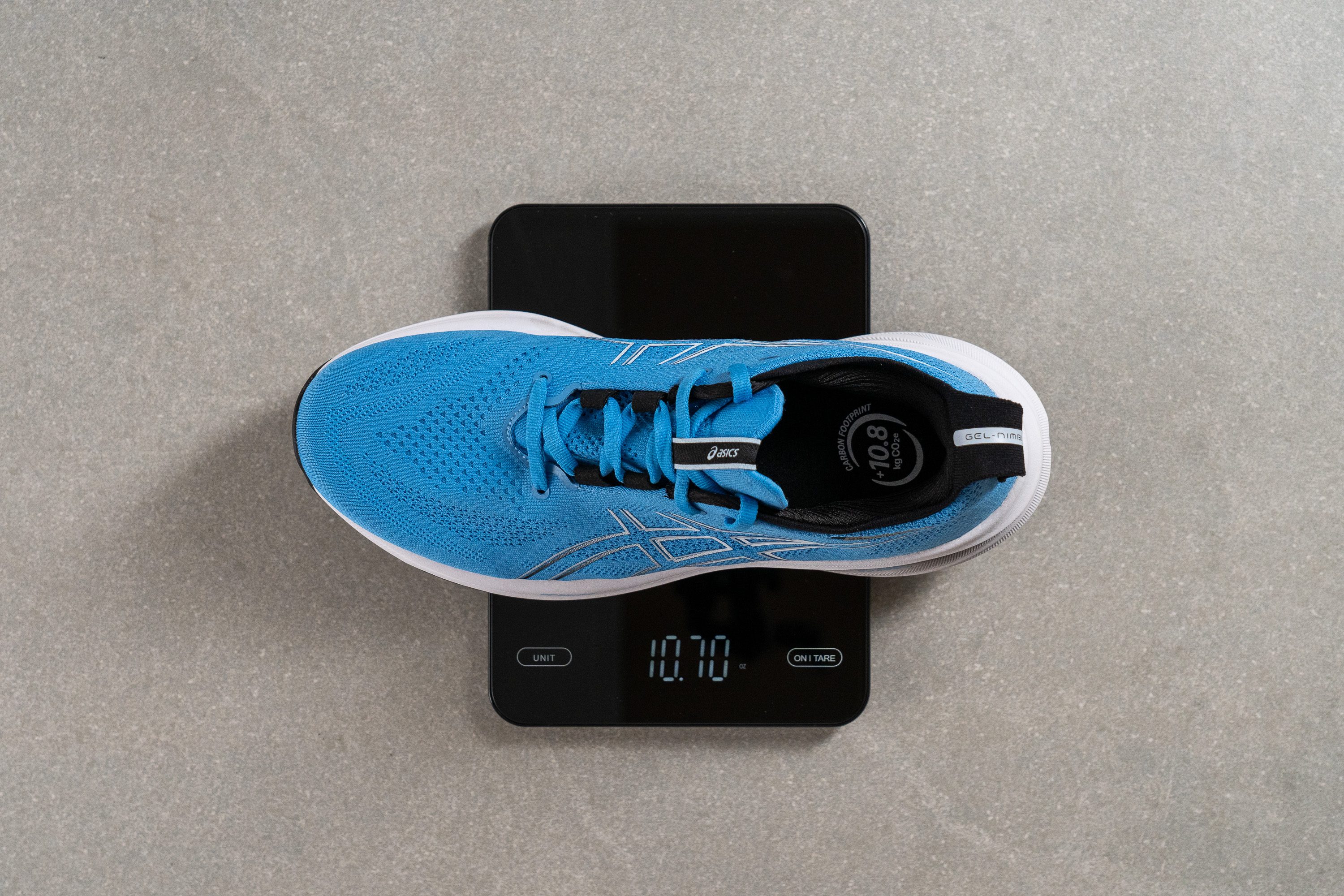
| Gel Nimbus 26 | 10.7 oz (303g) |
| Average | 9.3 oz (264g) |
Breathability
One of the major complaints we had—and so did many users—about the Nimbus 25 was its limited breathability, owing to the thick, pillow-like knit upper. It felt almost suffocating in the sweltering summer heat and delivered blisters everywhere.
We found that ASICS was quick to pick up on this issue right from the get-go and, to our delight, they've made significant improvements in the v26. With our smoke-pumping machine at work, we clocked a breathability score of 4/5—a top-notch performance that makes it an ideal choice for all-weather training, in our opinion.
The light test, despite its simplicity, remains a lab favourite for its ability to vividly showcase where a shoe breathes best. In the Nimbus 26, it's evident—ASICS has given special attention to the tongue and the toebox, though the midfoot remains less ventilated.
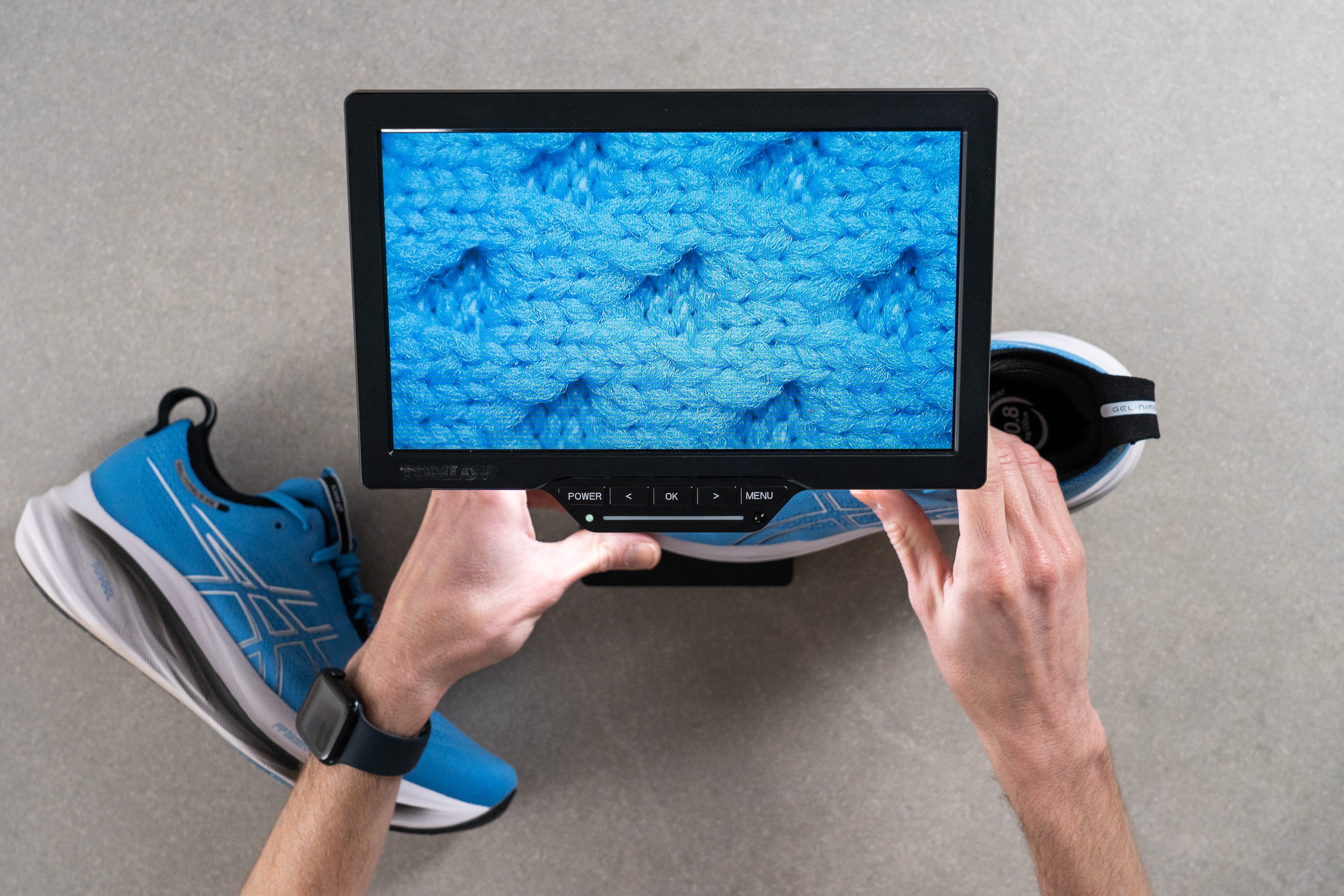
Moving on to the microscope, it proved to be the ultimate tool for examining the ventilation holes we'd initially spotted with the light test.
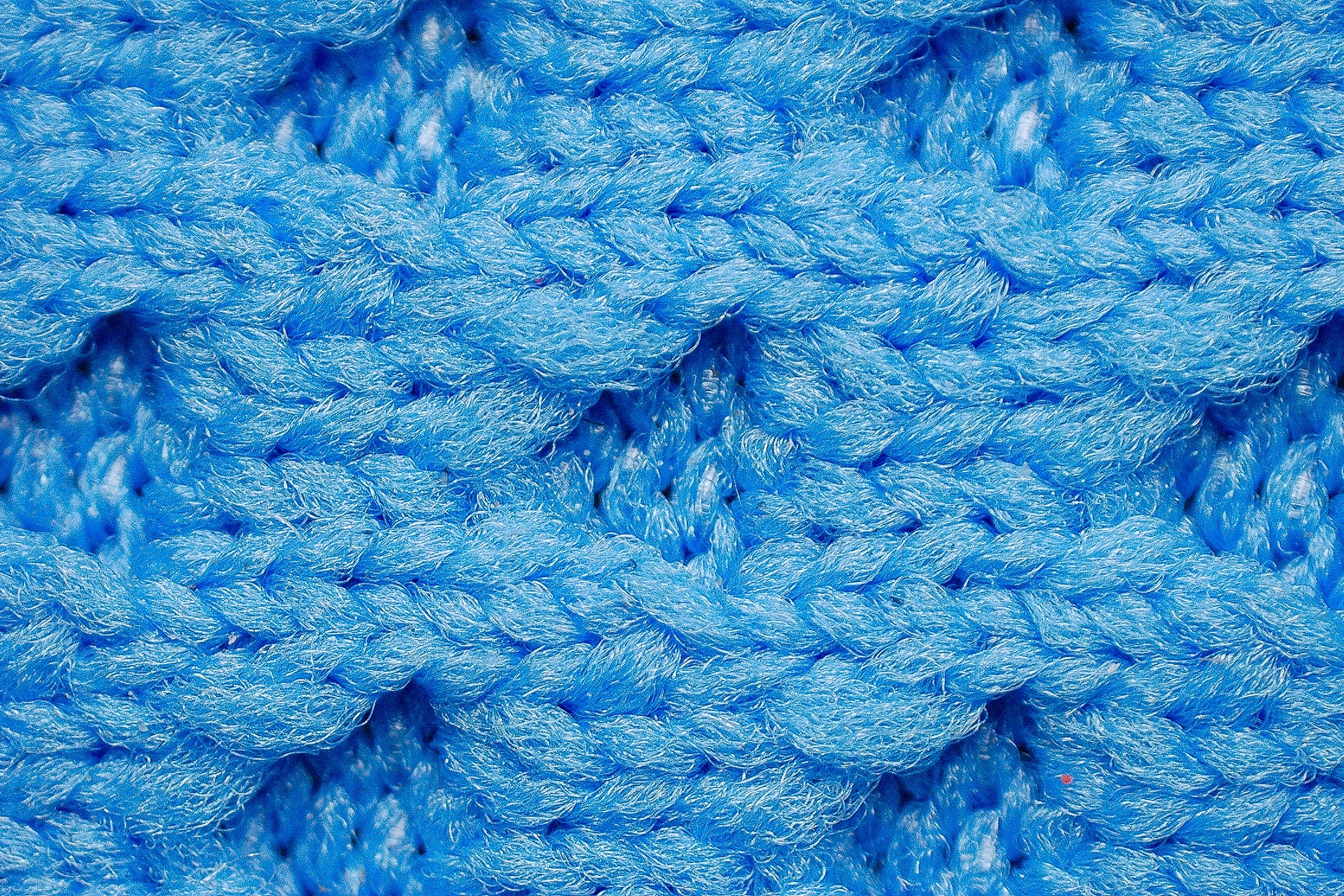
ASICS has punched holes at regular intervals, a few millimetres apart, ensuring optimal airflow.
Finally, when we got hands-on with the knit upper, we loved it. From our standpoint, it ranks as one of the most comfortable, plush uppers we've ever had the pleasure of testing in the lab. The entire knit exudes a premium, stretchy feel, and the heel padding is mind-blowing, focusing purely on comfort.
| Gel Nimbus 26 | 4 |
| Average | 3.7 |
Stability
Lateral stability test
With over 40 mm of stack height—even exceeding the race-day legal limits—we braced ourselves for a potentially wooobbly ride in the Nimbus 26.
However, while it's not the go-to option for those seeking stability (if that's you, the Kayano 30 might be a better fit), we found it surprisingly offers a reasonably stable ride.
ASICS managed this feat by designing a rigid, wide sole and incorporating sidewalls that gently steer the feet forward in every stride. We think this approach is a good choice for providing stability in a shoe with such a high stack.
Torsional rigidity
After testing over 500 shoes in the lab, we've learned that shoe design is all about trade-offs, balancing one feature against another. In the case of the Nimbus 26, the trade-off is between flexibility versus stability.
The Nimbus 26 turned out to be exceptionally rigid, almost mirroring the stiffness of a carbon-plated shoe. We had to award it 5/5 in rigidity, so we caution against choosing this model if you prefer a natural running feel, where the shoe flexes in harmony with your feet. Consider the Nike Pegasus 40 as an alternative.
| Gel Nimbus 26 | 5 |
| Average | 3.5 |
Heel counter stiffness
The heel counter is notably less stiff, a feature we genuinely appreciated, as anything stiffer might have been overkill given the shoe's extreme torsional rigidity.
We deduced that ASICS was able to integrate a moderately firm heel counter (rated 3/5) due to the shoe's well-designed geometry and the supportive midsole sidewalls. These elements effectively guide the foot straight, eliminating the need for an excessively rigid component in the heel.
| Gel Nimbus 26 | 3 |
| Average | 2.9 |
Midsole width - forefoot
The forefoot is relatively wide, though not to the extent often seen in stability shoes. We measured it at 118.4 mm.
This design choice resonates with us, considering the shoe primarily caters to heel strikers. Opting for an overly wide forefoot would have unnecessarily added to the shoe's weight and bulk.
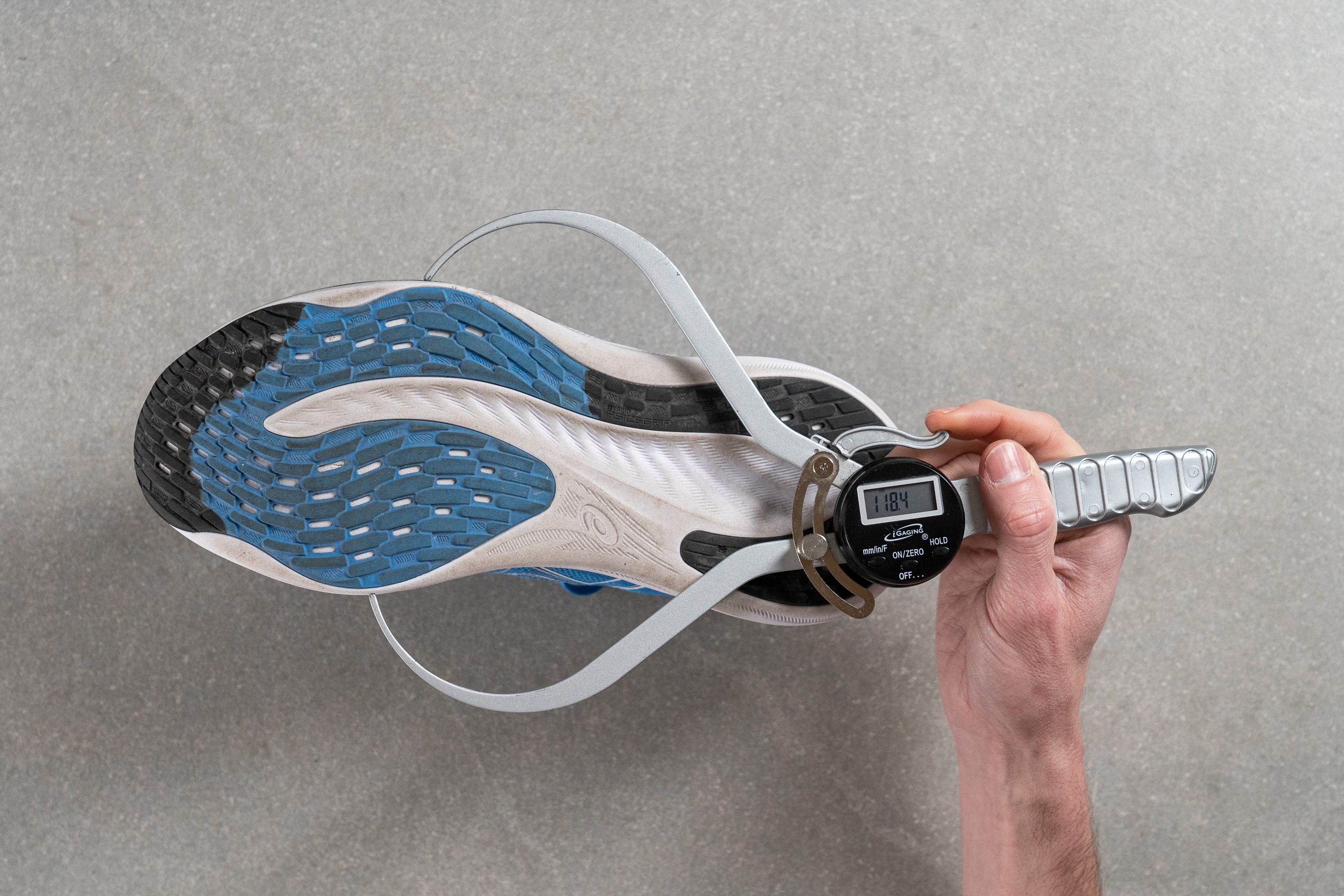
| Gel Nimbus 26 | 118.4 mm |
| Average | 114.3 mm |
Midsole width - heel
ASICS significantly widened the heel platform to guarantee secure landings for rearfoot strikers. Our measurements showed a width of 101.7 mm, surpassing the width of many stability shoes.
This design choice contributes to a notably stable feel in the heel for neutral runners. For this reason, if you have mild stability needs, the Nimbus 26 might be worth considering, though we lean towards recommending the ASICS GT 2000 12, which is tailored specifically for those with slight stability concerns.
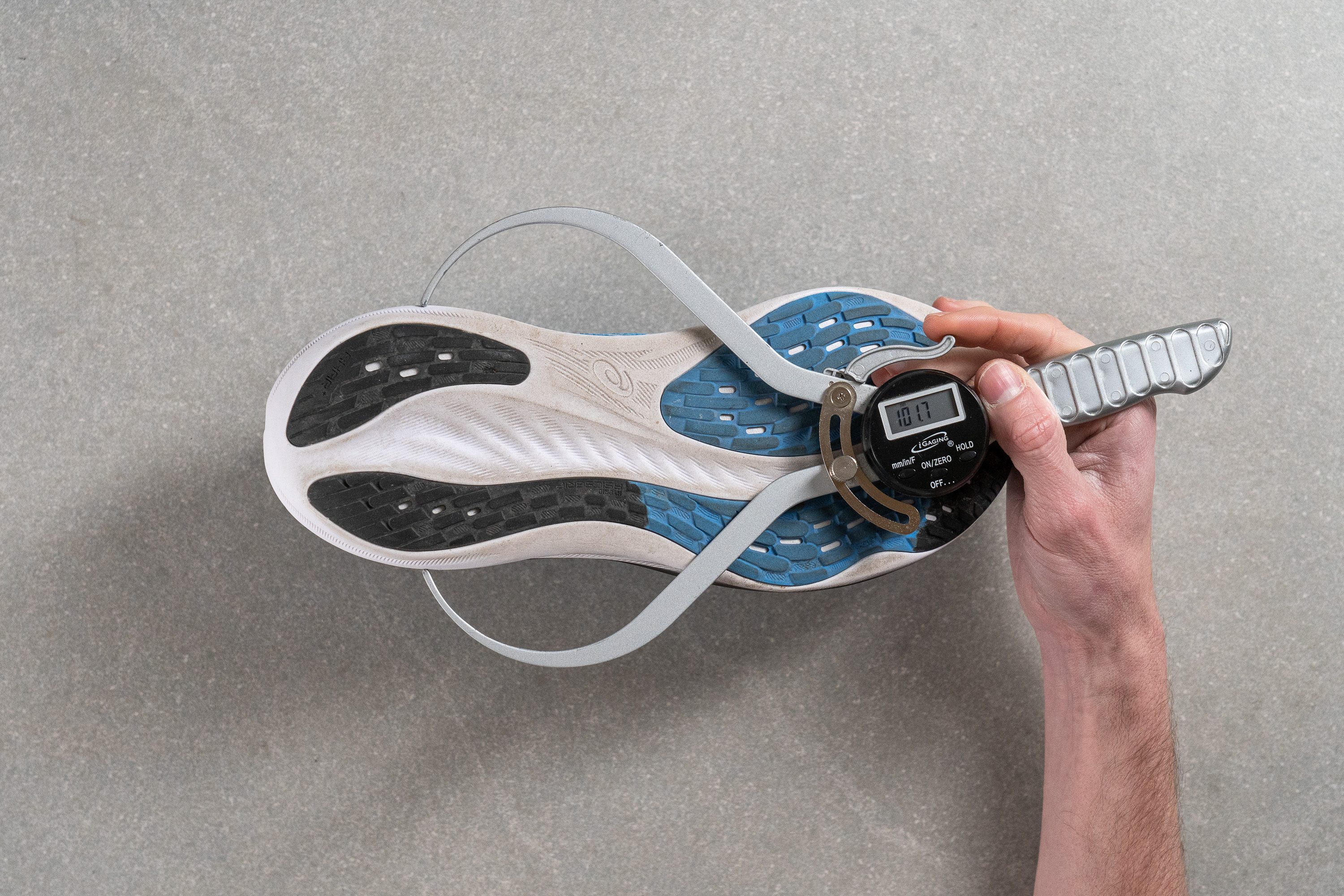
| Gel Nimbus 26 | 101.7 mm |
| Average | 90.7 mm |
Durability
Toebox durability
Durability often emerges as a weak spot in knit uppers, as the softer yarns are more susceptible to damage. Thus, we approached our initial Dremel test with moderate expectations.
Contrary to our assumptions, the Nimbus 26 showcased its resilience, underscoring the value of rigorous lab testing. The outstanding 4/5 rating we awarded this shoe was a pleasant surprise, with the knit upper displaying remarkable toughness.
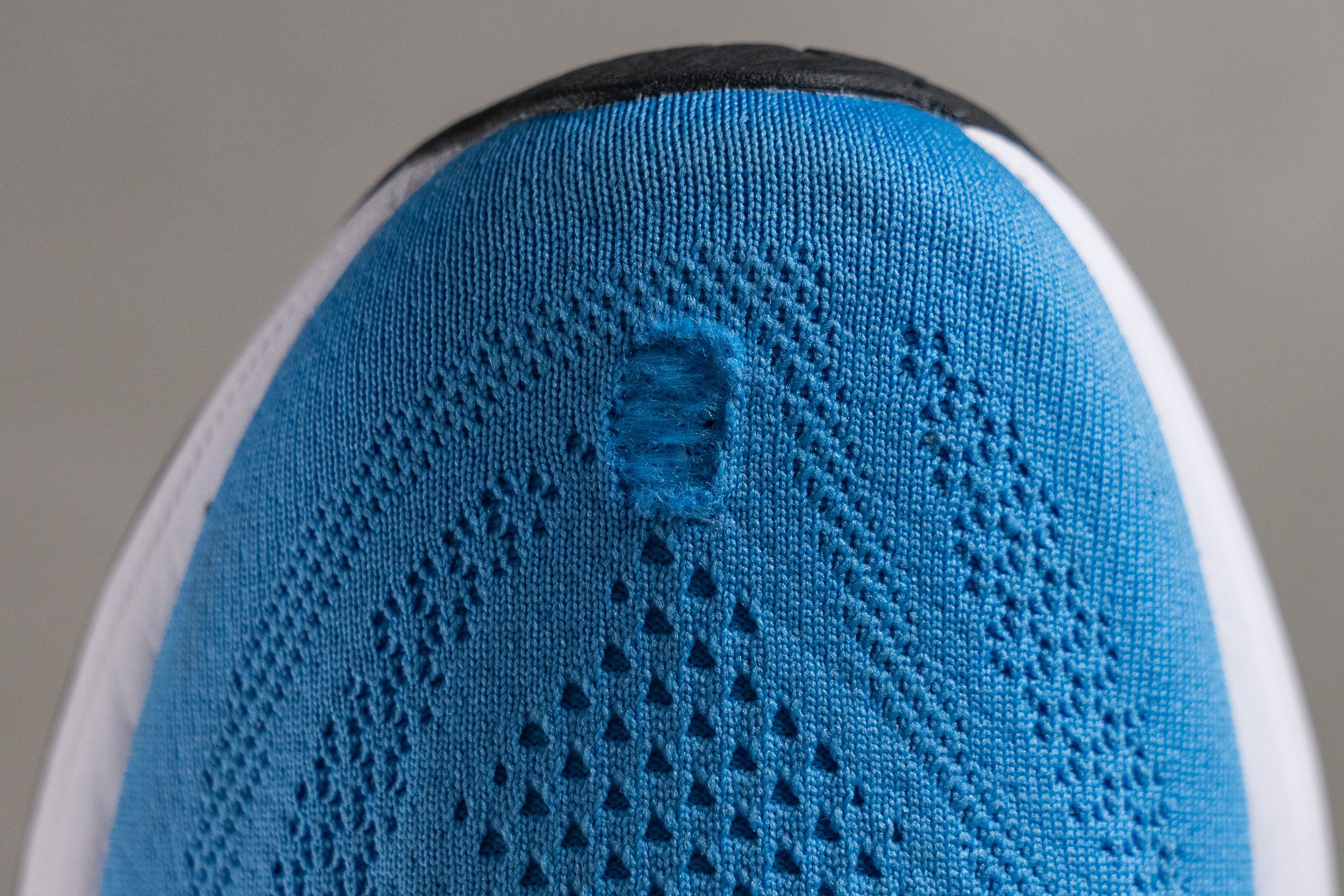
| Gel Nimbus 26 | 4 |
| Average | 2.6 |
Heel padding durability
We then shifted our focus to the pillow-padded heel, which, based on typical outcomes with other shoes, we initially thought would score low.
Yet again, we were pleasantly surprised, as it impressively secured another 4-out-of-5, truly deserving our applause. Wear and tear in the heel area is now the least of our concerns.
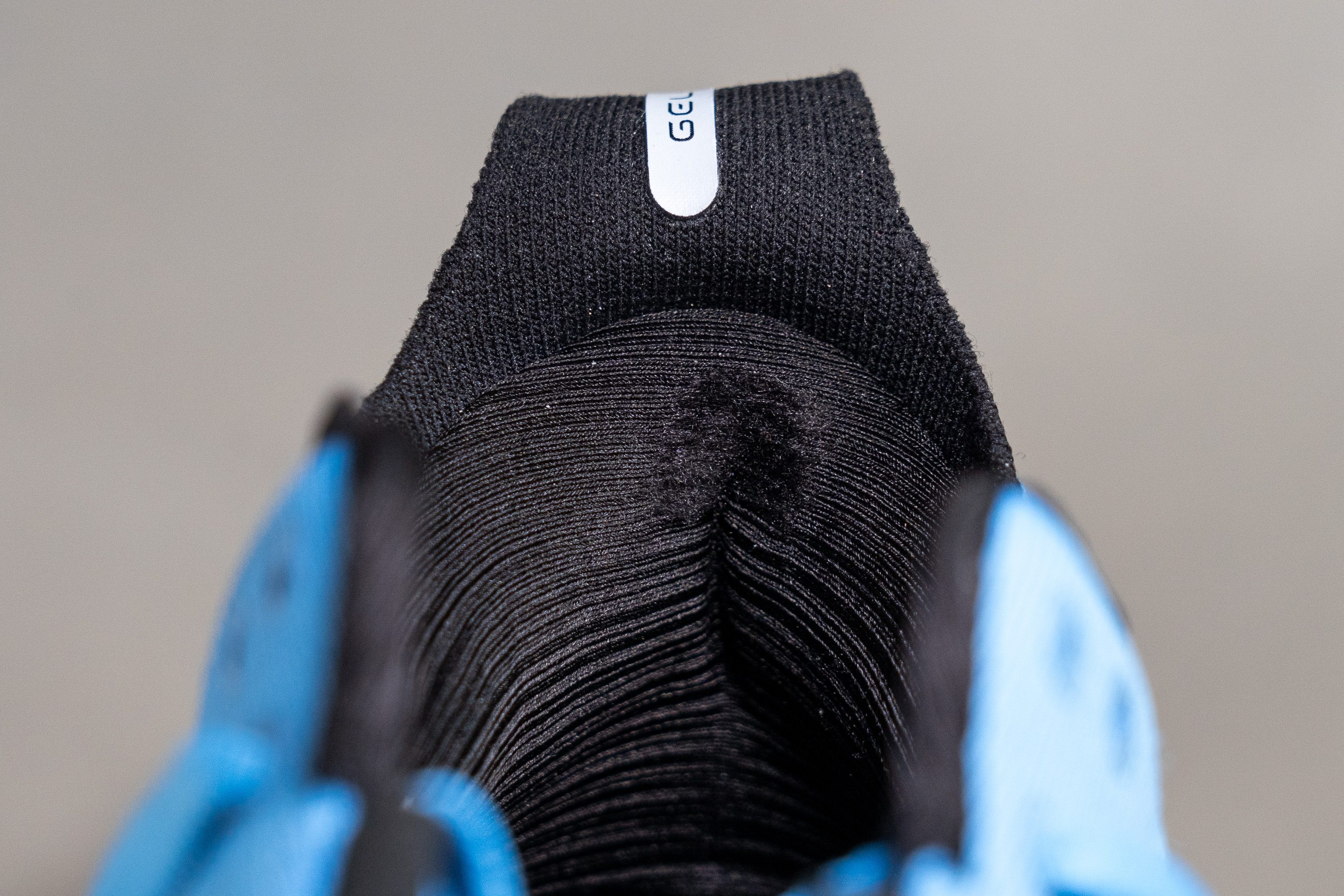
| Gel Nimbus 26 | 4 |
| Average | 3.4 |
Outsole hardness
Another major thing regarding wear and tear in any road running shoe is the outsole, particularly in a high-end daily trainer like this one, priced at £160—early wear could be disastrous for your wallet.

To gauge its performance in this aspect, we began by measuring the outsole's hardness. We clocked it at 83.5 HC, which is around the average.
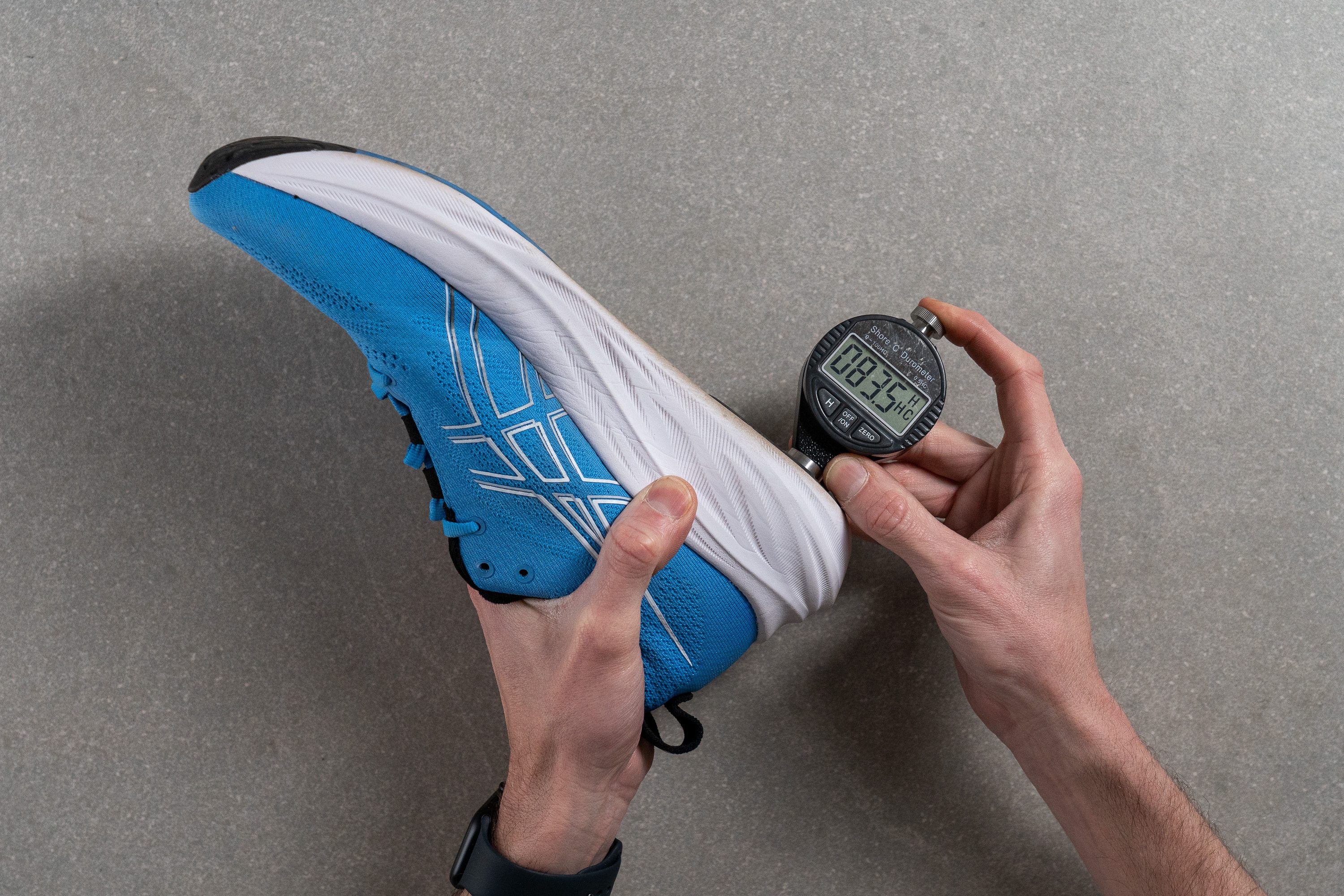
| Gel Nimbus 26 | 83.5 HC |
| Average | 79.2 HC |
Outsole durability
We put the outsole's durability to the test in the heel area—typically the first to show wear for many runners, especially those facing stability challenges.
Our second Dremel test yielded another impressive result. The tool managed to remove only 0.6 mm of the AHAR+ rubber from the heel, indicating that the outsole is built to last for the long haul!
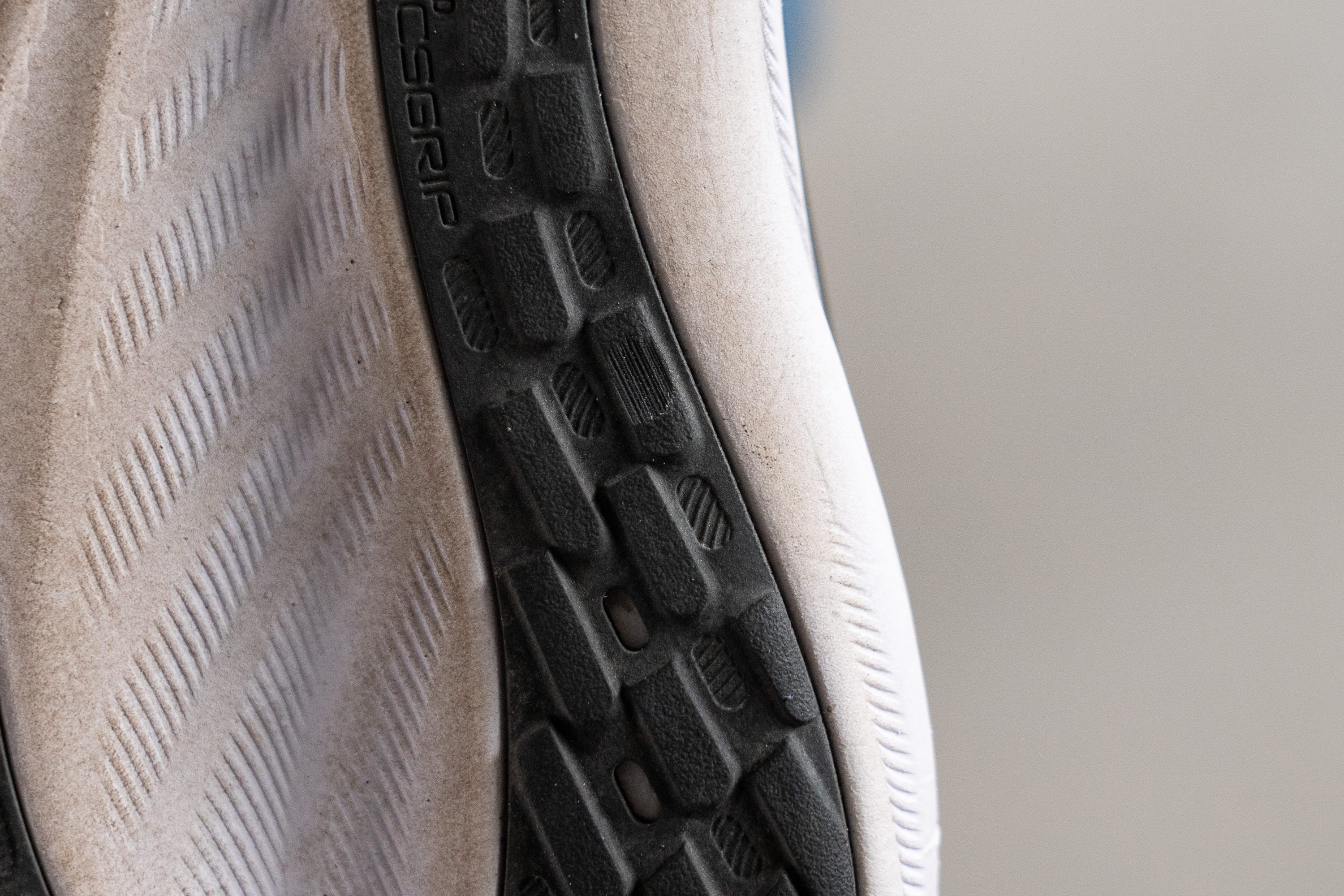
| Gel Nimbus 26 | 0.6 mm |
| Average | 1.1 mm |
Outsole thickness
Afterward, we turned our attention to the outsole thickness. ASICS opted for a slightly thinner design here, which we consider a positive move, especially given the outstanding results from our previous tests.
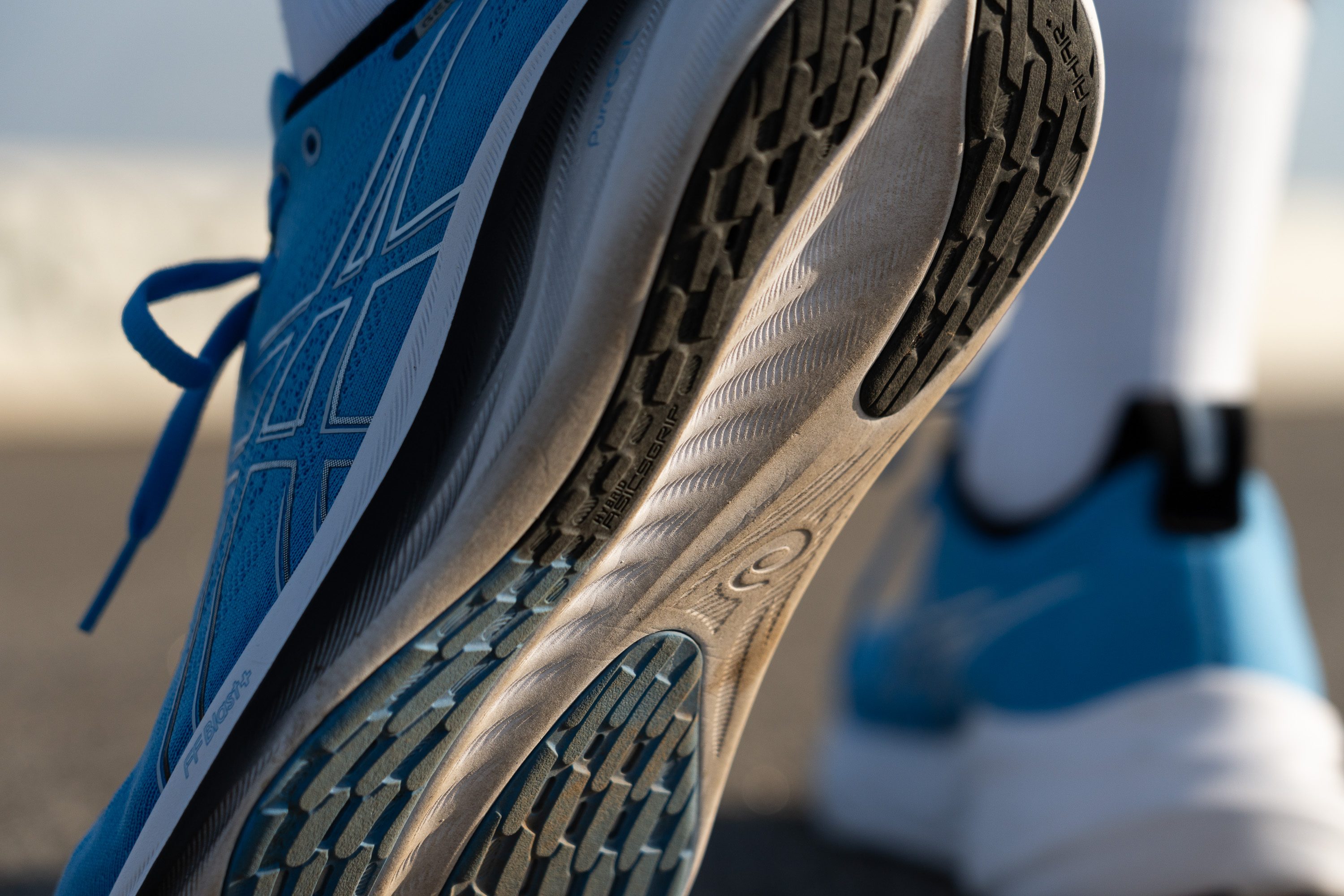
Choosing a thicker outsole often guarantees durability but can mute the feel of the ride, rendering the shoe somewhat cumbersome for long runs and significantly heavier.
Therefore, a 2.3 mm thickness seems to hit the sweet spot for us, yet we believe ASICS could potentially reduce it to below 2 mm for next year's version.
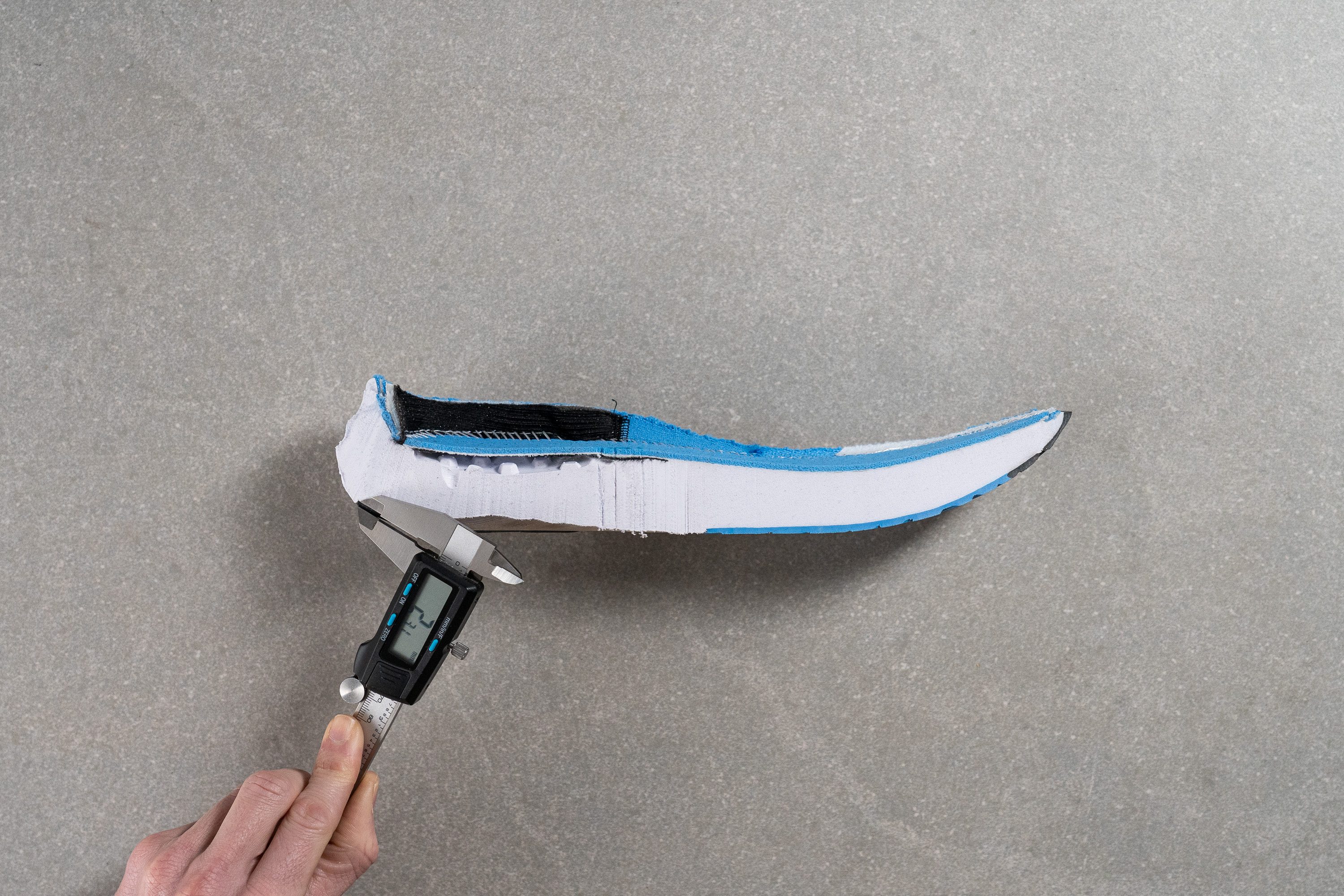
| Gel Nimbus 26 | 2.3 mm |
| Average | 3.2 mm |
Misc
Insole thickness
The insole, crafted by Ortholite, is exceptionally plush with a substantial thickness of 5.0 mm.
Its considerable thickness also makes it an ideal choice for those looking to increase space within the upper by substituting it with a thinner insole.
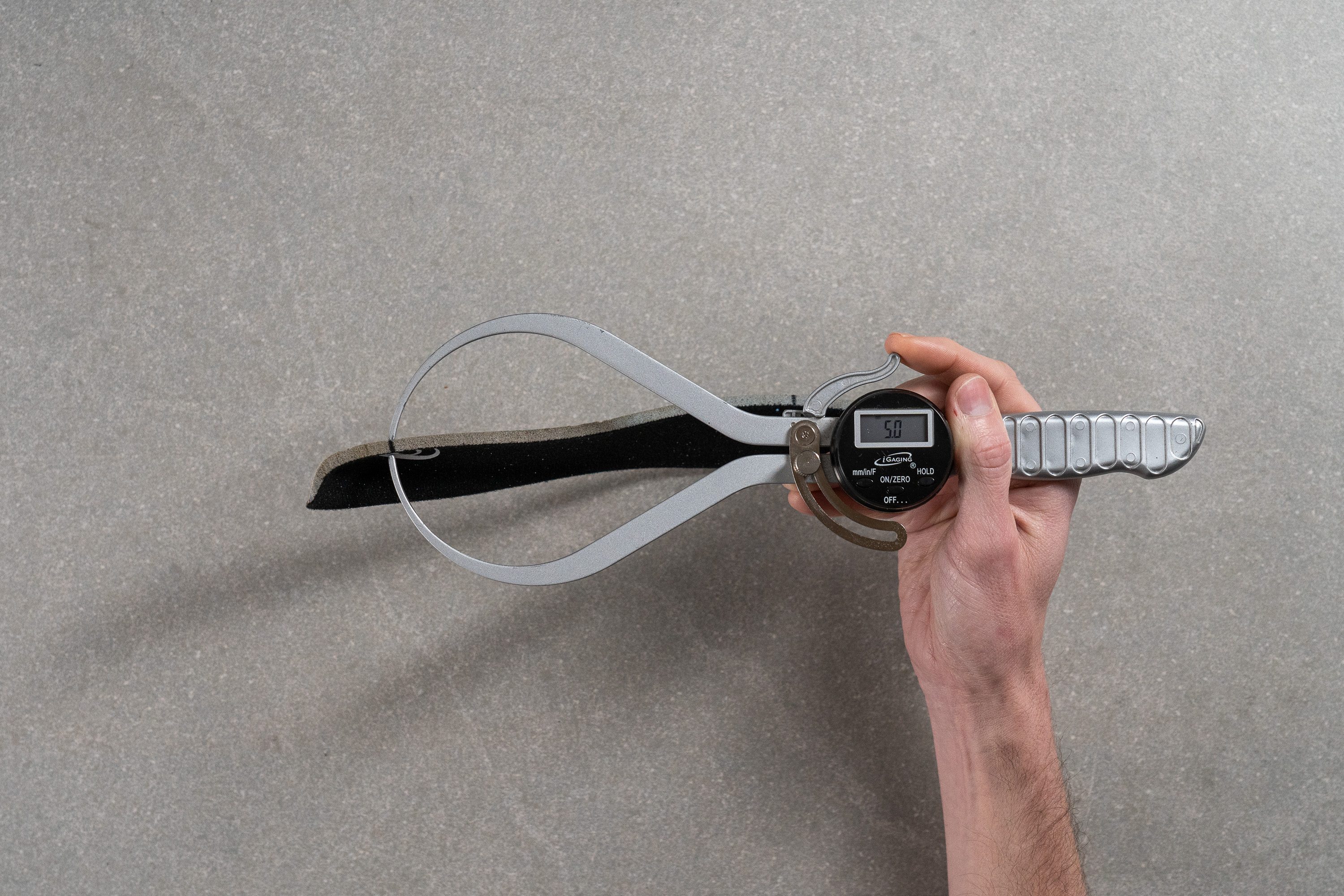
| Gel Nimbus 26 | 5.0 mm |
| Average | 4.5 mm |
Removable insole
The Ortholite X-55 insole is fully removable, making it a snap to swap with aftermarket orthotics if needed. We tested this with several different insoles and found the process completely hassle-free.
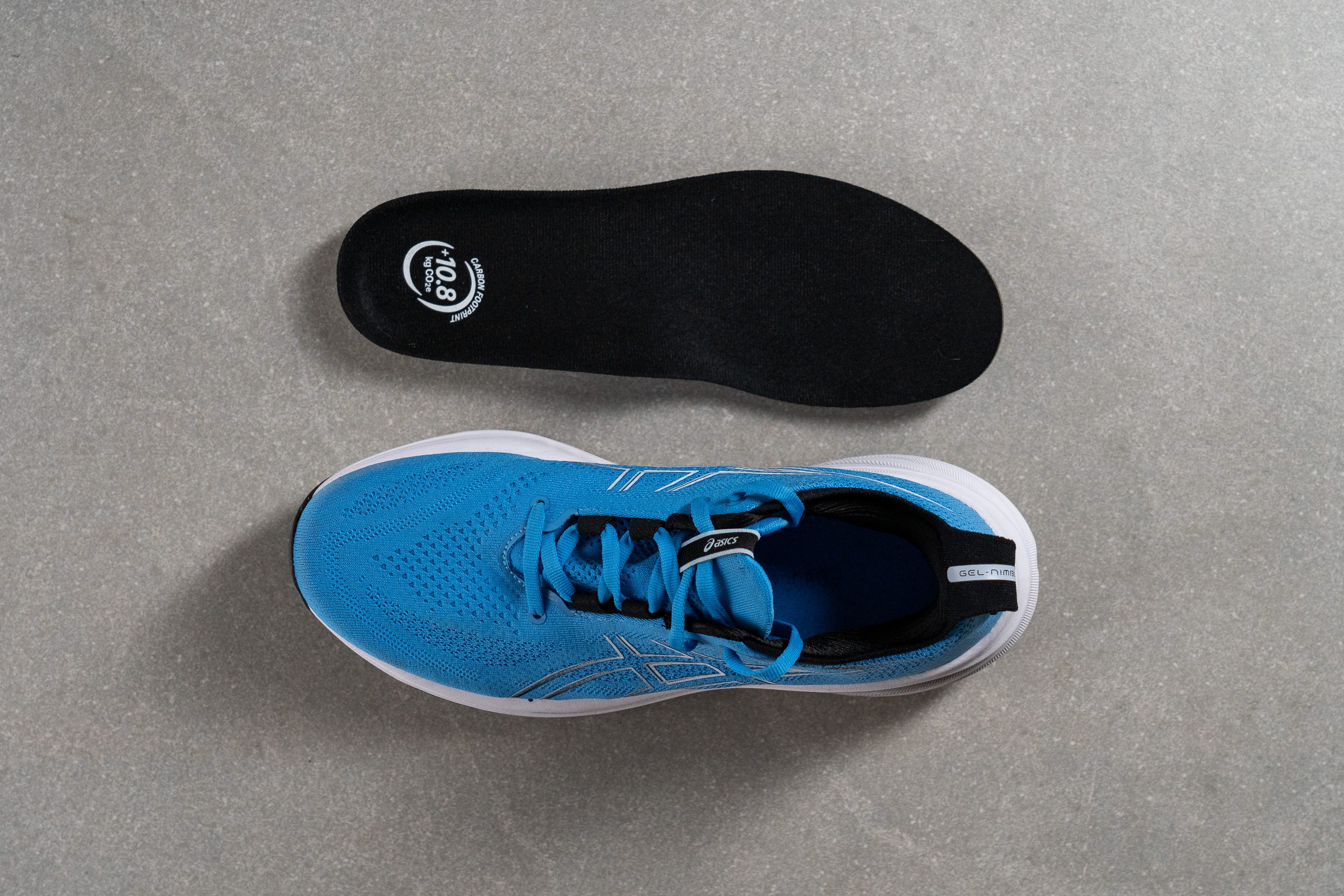
| Gel Nimbus 26 | Yes |
Midsole softness in cold (%)
The FF Blast+ ECO foam isn't merely standard EVA, as we mentioned earlier, but a blend of EVA and Olefin developed by Dow. This distinction was crucial in our testing, given that EVA foams typically falter in cold conditions, hardening significantly.
Yet, the Nimbus 26 demonstrated moderate resilience in our cold-temperature test, stiffening by just 27% after a 20-minute stint in our freezer. This is a result that leaves us content.
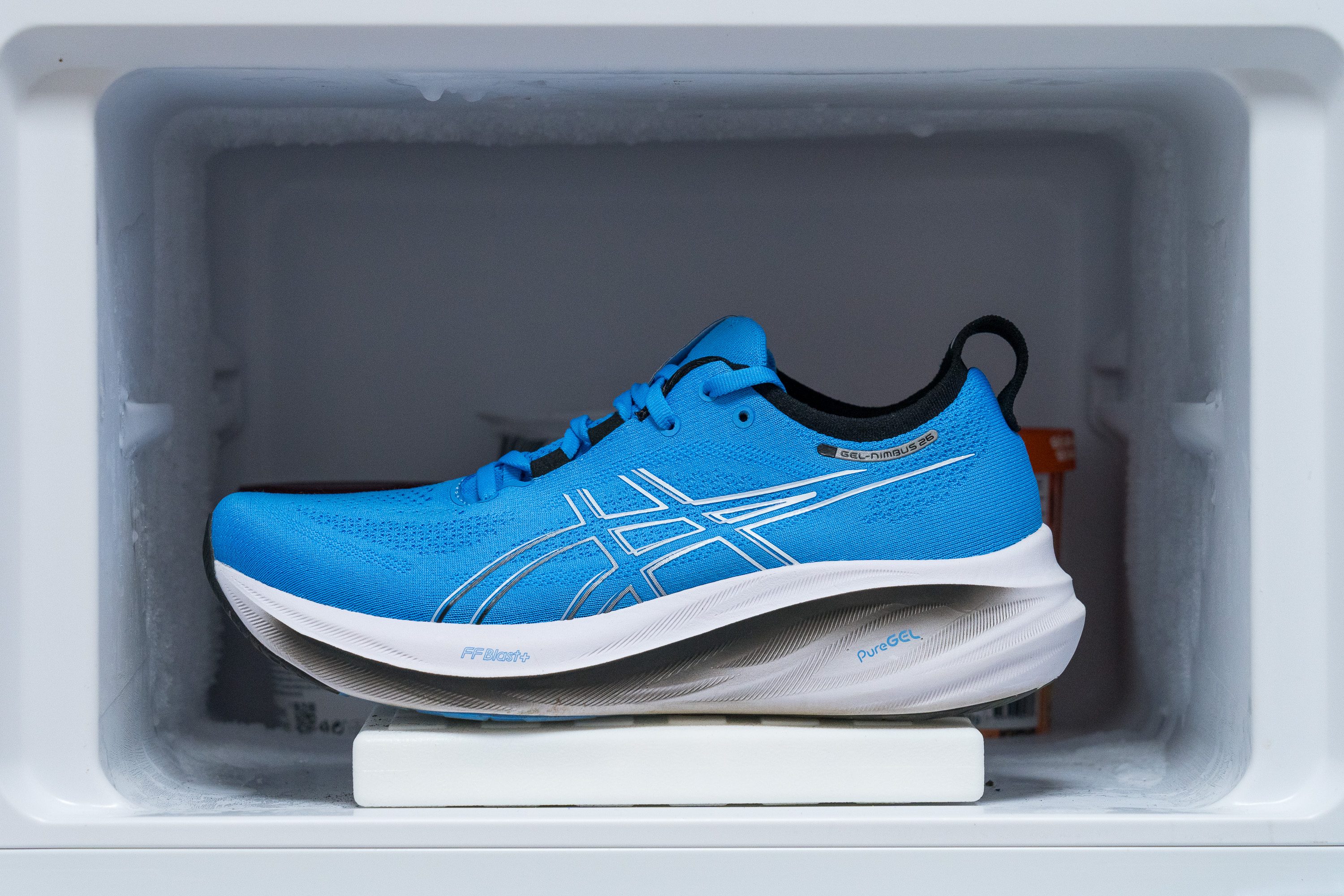
| Gel Nimbus 26 | 27% |
| Average | 24% |
Reflective elements
The Nimbus 26 includes a few, basic reflective pieces. Frankly, this feels like the bare minimum.
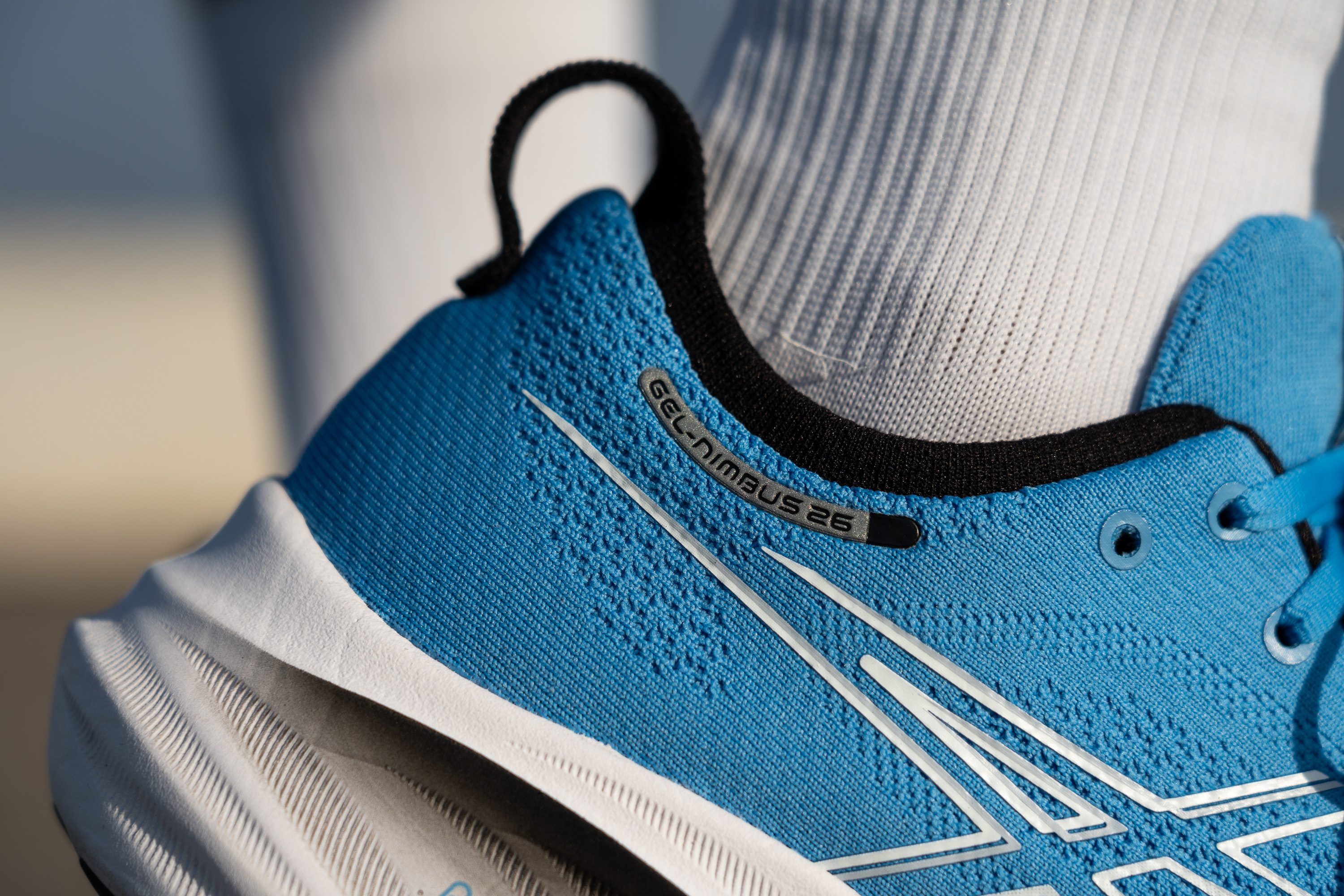
It's apparent that ASICS follows the same pattern year after year—those wanting full reflectivity need to wait for separate Lite-Show versions of the shoe.
| Gel Nimbus 26 | Yes |
Tongue padding
While the Nimbus 26 focuses on all-around plush comfort, its surprisingly thin 4.1-mm tongue stood out to us despite being considerably thicker than the previous version.
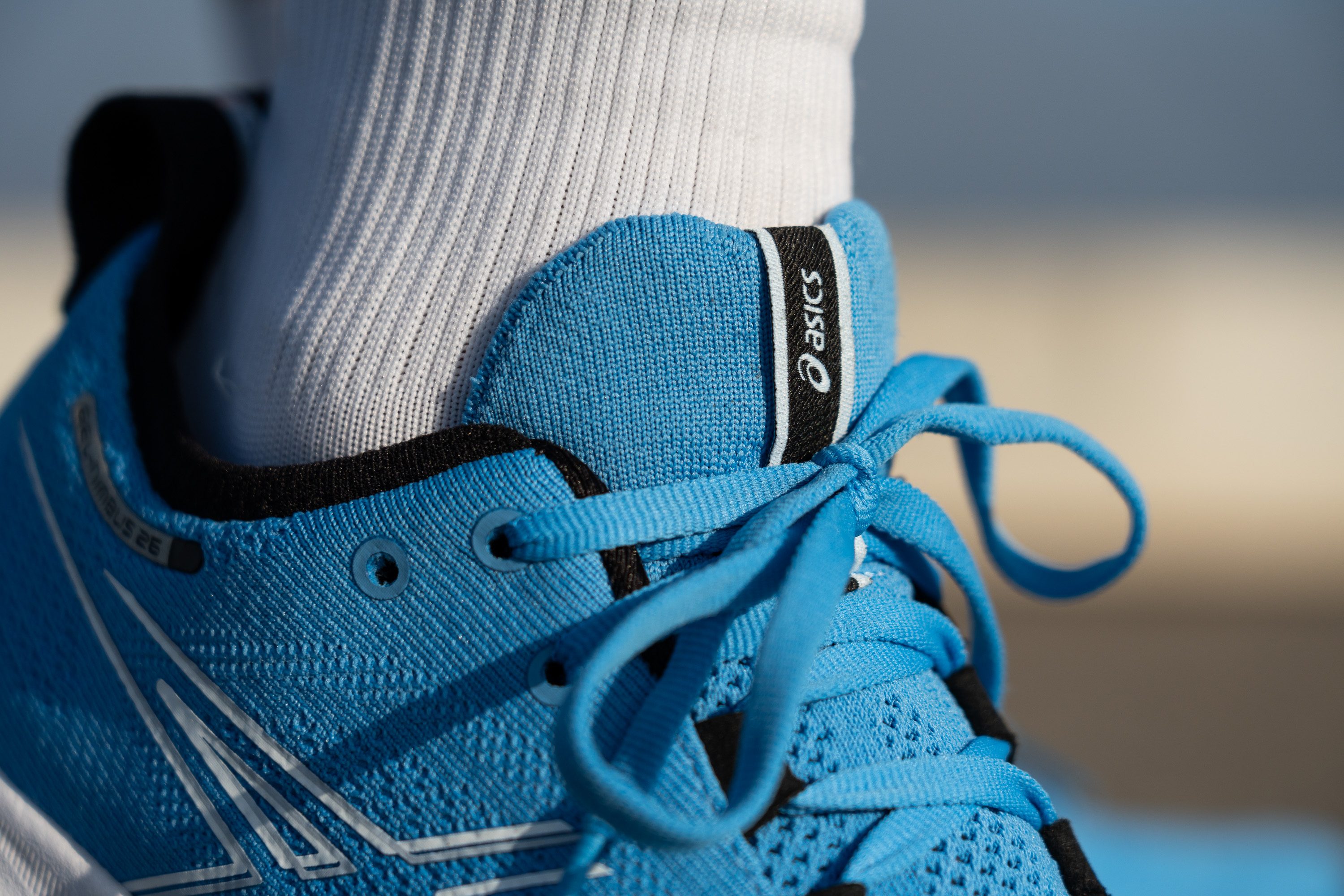
Initially, we were concerned about potential pressure points. However, extensive long-run testing proved these fears unfounded—the tongue caused no discomfort whatsoever.
Still, it's worth noting that other comfort-focused trainers like the Brooks Ghost 15 often feature tongues twice as thick, an option potentially limited by the Nimbus 26's emphasis on weight.
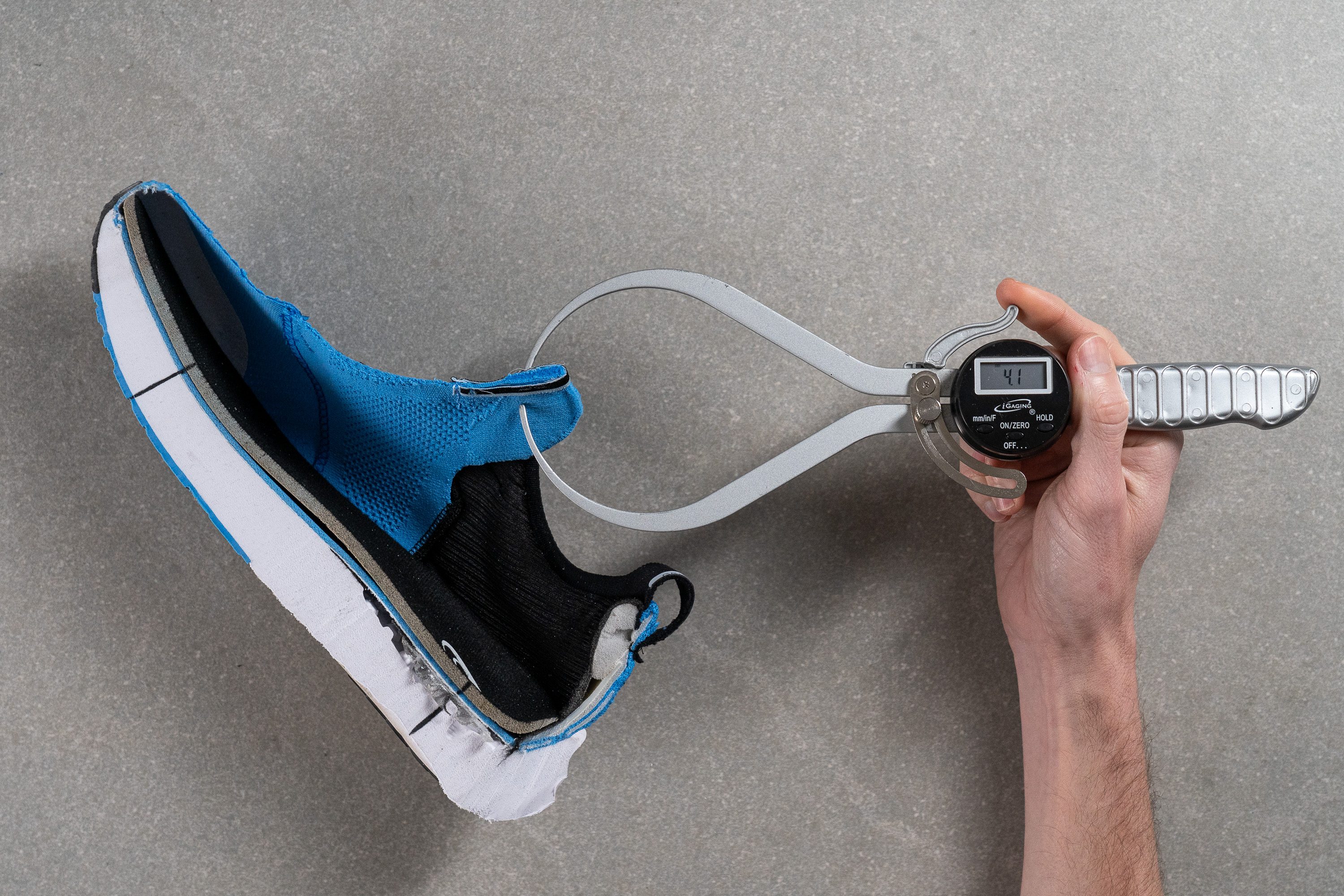
| Gel Nimbus 26 | 4.1 mm |
| Average | 5.8 mm |
Tongue: gusset type
We shifted our focus to the tongue area and observed that the tongue is semi-gusseted—a remarkable strategy for achieving optimal lockdown.
Yet, we were surprised, as knit uppers typically come with fully-gusseted tongues, or even bootie-style designs.
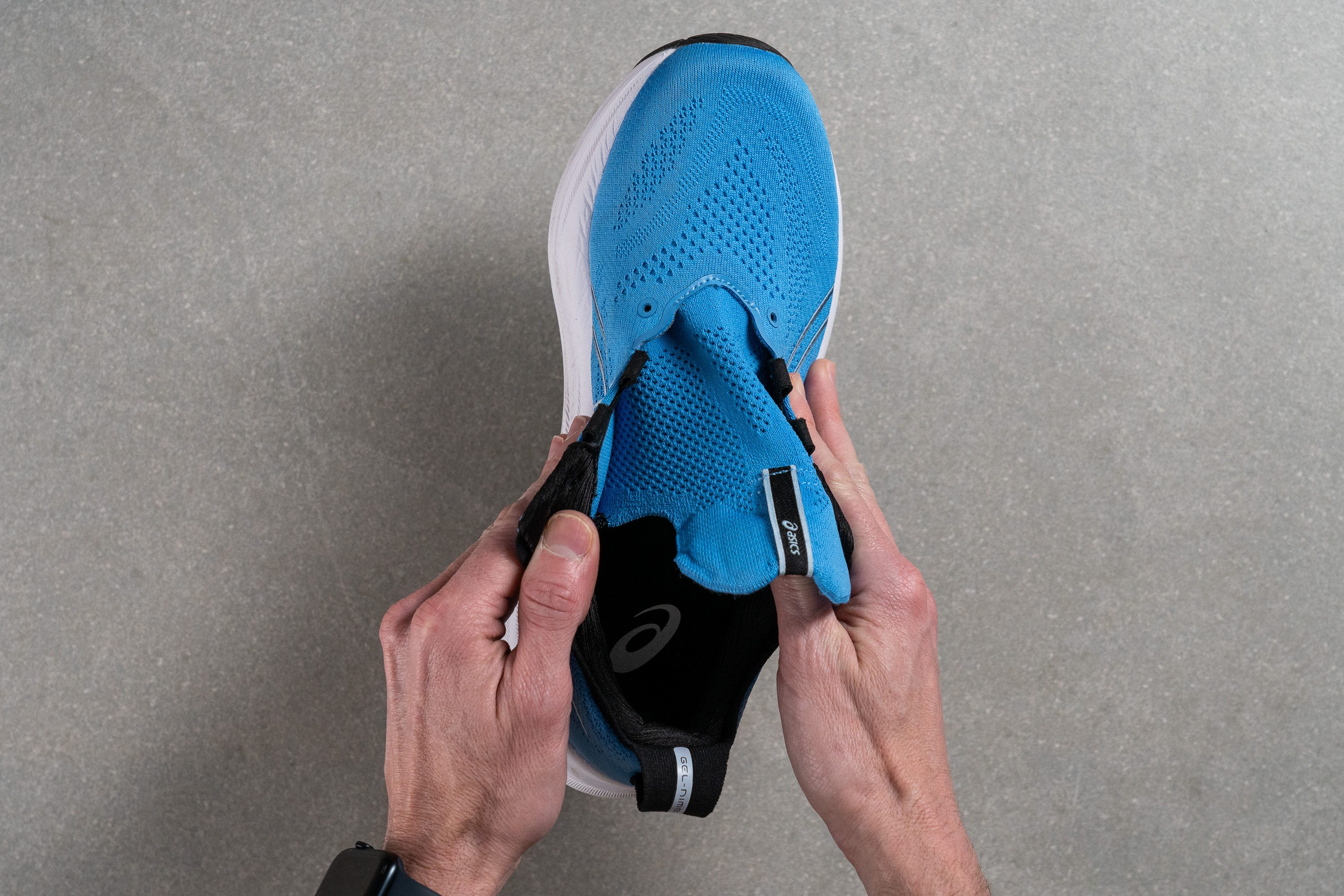
| Gel Nimbus 26 | Both sides (semi) |
Heel tab
The heel retains its distinctive, oversized finger-loop tab from the previous design. This striking addition isn't just visually amazing, we found it makes sliding into the knit upper a breeze!
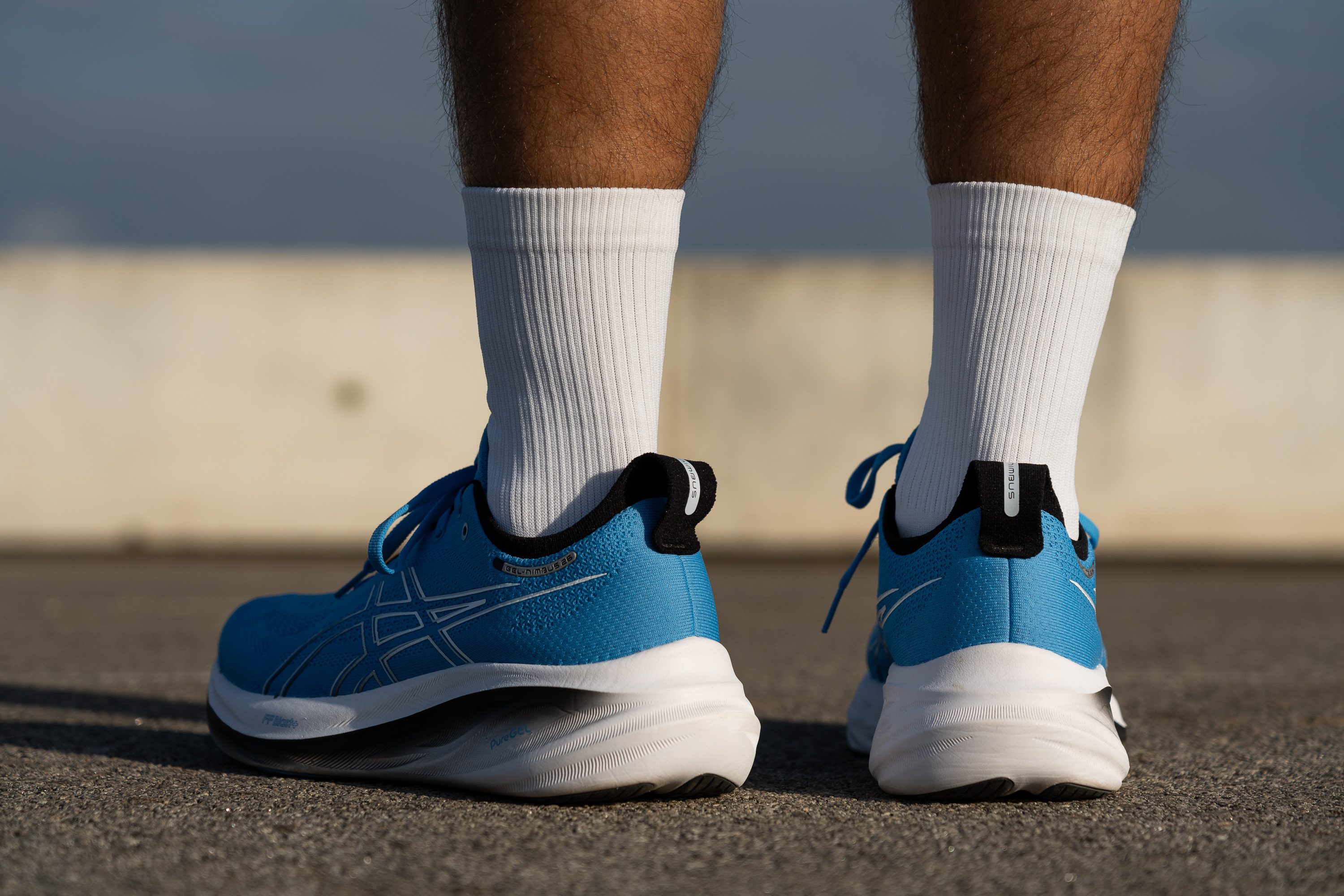
| Gel Nimbus 26 | Finger loop |

